#each story is about a different protagonist and monster but the characters from previous games show up as side characters
Explore tagged Tumblr posts
Text
i always used to watch yt videos of games i wanted to play bc i knew i didn't have the money then and didn't have anything to play games on but now that i have a good computer and some more financial independence. i could start playing all the games that my amnesia has erased
#i could play Amnesia! lmao#its almost like playing the game blind again#i've just been watching a lot of videos about games i'd forgotten about from when i was like 12#like all those old horror games that jacksepticeye would play#somehow i Still remember the exact video that made me start getting into youtube#jack's curse of blackwater videos#specifically the first one#because at the time my only experience with youtube was watching nothing but various cat compilation videos#but then i watched this creepy game video#and the little ghost girl scared me so bad i stopped watching and was like NOT WATCHING ANY MORE OF THAT#but then i couldnt stop thinking about it for three days so eventually i watched The Last Four Minutes#and then the rest of the game stopped doing ghosts and moved to like. aliens. or at least a physical monster#and it just stopped scaring me#it went from scary dark unfamiliar asylum with a probable ghost and body parts everywhere#to cold unfeeling steel facility#i just Stopped being scared after that physical monsters scare me much less#ghosts. now that's a threat you can't track#that one doesn't make noise to let you know it's coming#anyway i wanna play imscared i remember being obsessed with that one when i was watching those videos#i wanna remember the other like. random horror games i got obsessed with#ib and mad father and the crooked man i remember liking#recently i found out that the crooked man has like. a whole series?????#each story is about a different protagonist and monster but the characters from previous games show up as side characters
1 note
·
View note
Text
I am a little sad Silent Hope didn't get as much attention from Rune Factory fans as I was expecting it to.
It's definitely a flawed game due to how repetitive the gameplay is and that the later floors of the Abyss do very little to change the overall formula outside being larger and having different area-specific traps, but the graphics are lovely, it has a very likable and interesting cast of characters, and the story, while simple, conveys such an important message about the very nature of human language itself; the same words people use to harass and hurt each other are the same words we use to help others and tell them that we love them, and saying nothing can be just as hurtful as saying the wrong thing. Hell, the lead singer of Kami Wa Saikoro Wo Furanai, the band who performed the game's opening theme, described the game's plot and themes as feeling like an antithesis to social media.
Honestly, the thing that excites me the most with Silent Hope is the potential lore implications for the Rune Factory series, as the game was originally conceived as a title to expand the universe. I mean we now know regular animals in the Rune Factory universe look like those from Story of Seasons games that use the bubble cow design, and the whole "monsters are the reincarnated souls of the dead" thing I highlighted in a previous post potentially provides insight into just how monsters are created within the Forest of Beginnings.
If Silent Hope gets a sequel in some form, I'm excited to see where it goes in terms of plot and setting; Rune Factory has so much potential due to its fantasy setting, but has always been somewhat limited in terms of greater world building due to how the games are structured. The protagonists are almost always confined to the region where the town they wake up in is located and while certain recurring elements ensure that the games are connected, they never get expanded on beyond what necessary for the current plot; for instance, the capital of Norad, Palermo, has been brought up multiple times throughout the series, but there's never been a game where you actually get to go to it. A sister series would be an excellent opportunity to expand on such elements, how ever indirect.
17 notes
·
View notes
Text
The Ultimate Grand Prix
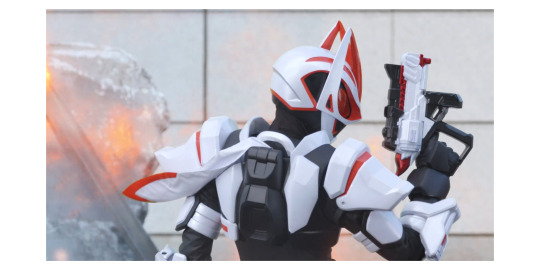
Fortnite. Pubg. The Hunger Games. What do all of them have in common? That’s right, they’re all battle royals. The concept of a battle royal is something that we’ve all seen plenty of times in entertainment. And while it can be fun when done right, it can also be a drag when done poorly. So allow me to introduce you to one that knocks it out of the park.
Kamen Rider Geats is the second latest season of the series Kamen Rider. The best way I can describe Kamen Rider as a whole would be ‘Power Rangers’ if it centered on just one ranger and was Japanese. Each season stands alone, so you don’t have to worry about watching previous ones to understand everything. In my opinion Geats is one of the best seasons to watch if you are interested in getting into the series.
In Geats, normal people are chosen to participate in the Desire Royal as Kamen Riders. The prize for winning is to have whatever wish you want come true. This can range from simply being forever rich to having the world come to an end. To win, they participate in various games centered around defeating the monsters known as the Jyamoto, with the last player left standing at the end being the winner. Our protagonist is Ukiyo Ace, aka Kamen Rider Geats, the reigning champion. He uses a combination of wit, skill and charm to defeat his enemies and come out on top.
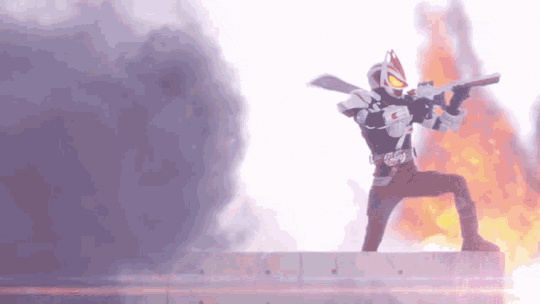
When it comes to Geats, people like to talk about three things: the story, the suit design, and the choreography. While I can’t go into detail to avoid spoilers, I can say with confidence that the story of Geats is top-tier. The show makes sure to focus on all of its characters in order to make them compelling. Characters are fleshed out and often given their own story arcs. If you're not careful, you might even find yourself rooting for the villains as they are just that charismatic. The story is also broken into ‘arcs’, making it so if you ever need a break, you’ll immediately be able to jump right in.
Another thing that Geats (and Kamen Rider as a whole) is known for is its incredible suit design. I mean, just look at them. Despite the simplicity, the suits are very well made. Each one follows a sort of motif that goes with that character. And due to the nature of the season, these suits are interchangeable, allowing you to see different styles on different characters. As the show goes on, the level of detail also evolves, creating absolutely beautiful suits.
I’m sure that you are used to seeing the sometimes cheesy fights in Power Rangers. However I can assure you that you’ll find none of that here. The choreography and cinematics are at times movie level. Each fight looks like great care was taken into directing it with camera angles being used to always get the best possible shot. When watching these scenes you might sometimes forget that what you’re watching is supposed to be a “kid’s show”.
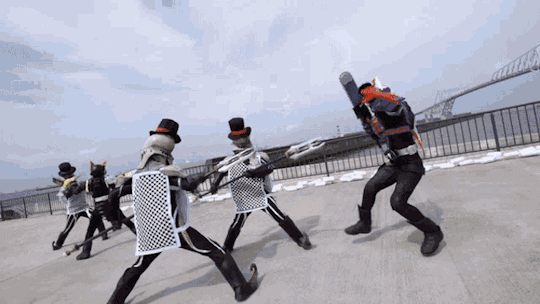
Kamen Rider Geats is considered by most if not every fan to be one of the best Kamen Rider shows. With an incredible story, great suits and amazing fights anyone who watches it is bound to be a big fan. If you yourself are interested in watching it, then you should go to Shout TV and look it up. You can watch the whole season there for free. And who knows, maybe you’ll figure out what it is that you desire.
Logan Floyd-Mcgee | Writer POP-COOLEDTURED SPECIALIST cooledtured.com | GROW YOUR COLLECTION
3 notes
·
View notes
Text
I just finished: Metro Exodus!
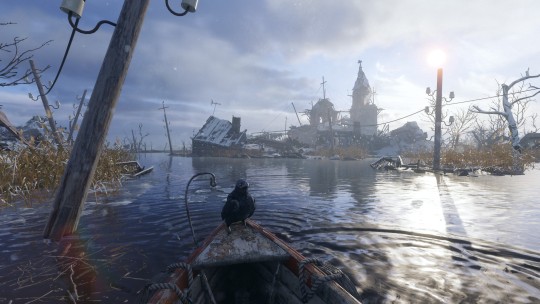
Compared to the previous Metro games, this one sure is a whole lot different, which isn't necessarily worse - but if you liked the previous games you won't necessarily like this.
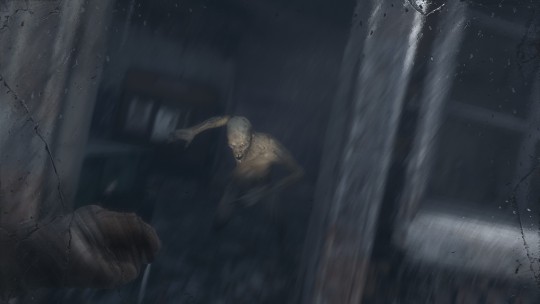
The game play is no way bad, though I didn't enjoy it as much as the other games - this is purely personal preference of course, as I enjoy Survival Horror style game play more. This one still has retains some elements of that, resource management is somewhat present, though it's more akin to a Fallout or Stalker game, instead of Resident Evil or F.E.A.R. Most of the horror themes have disappeared as well - whilst I'm not entirely sure if I would call the originals horror games, (if i need a single term I'd probably go for post-apocalyptic, the kind of thing I would think as being sterotypically Slavic) but they were certainly more so than this. Less fighting monsters, more fighting human 'survivors'. Most of the monsters you see are Zombies now, which I'm fairly sure weren't in the others, The game has a shockingly low number of mutants.
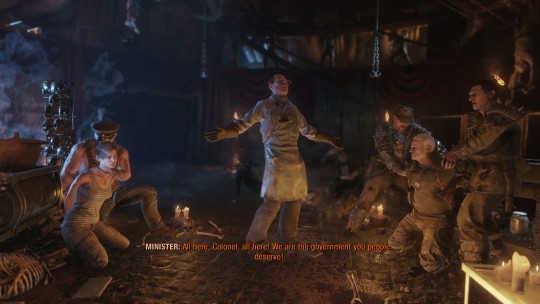
Along with horror, the sci-fi parts have also taken a hit, I almost forgot playing through this that the other games were mostly about psychic neohumans? The concept feels so at odds with the new direction they took this one. You might wonder, if it's not horror, not sci-fi, what is this new direction? Well of course it's still very much working within the Post-apocalyptic genre, focusing on disputes between various groups with differing political outlooks, as the survivors fight to stay alive - Exodus, however, focuses a lot more on that second part than the previous games, fleshing out the various characters far more and actually making me remember their names, or at least the fact they existed at all.
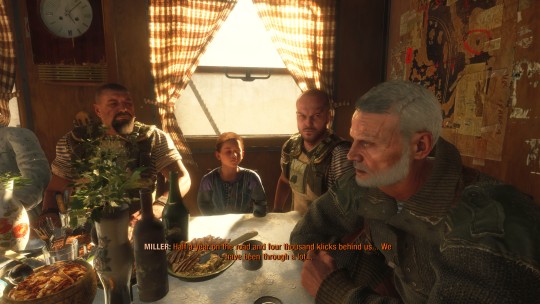
You have a small squad of characters that you stick with throughout the whole game, and each of them has at least something to distinguish them, even if it's fairly small (I'm pretty sure there's the staple one guy who likes food). I did find myself somewhat caring about them as the game went on, which is a huge change from the previous games where every character felt throwaway - I suppose part of this is a shift of the protagonist - Artyom's - perspective, previously no one in his life lasted long enough to get attached to, everyone almost immediately died or betrayed him -but now he has attained a stable social group, and a family. Speaking of which, Anna is the biggest change for the better, like many other games, now she and Arytom are married she has moved on from being the destined love interest, and she is allowed to be more of character in her own right.

It might seem odd that I haven't talked about the shooting or anything in what is primarily an FPS, but the characters storytelling was what really stood out to me in this game. Yes, it is fun to modify your guns to suit your play style and sneak around quietly shooting everyone - the Tikhar (air gun) is particularly cool in this one, and is given a lot of attention - but the how much the story moved me was kind of a shock. I'm not sure if other's will agree - I can see how people would just see it as stiff, or maybe tropey, but it hit me in a way I can't quite explain. - I actually almost cried at the end, even though it didn't come as any surprise.
Grade: B
Significance: 2/3
#videogames#game reviews#games#reviews#horror#horror games#fps#metro#survival#survival horror#postyapocalyptic#metro exodus#metro 2033#shooter#action game#action games
6 notes
·
View notes
Note
I think the Great Desparking was an interesting choice to take the storyline of Magic, but personally I'm not the biggest fan of the situation. While on the surface, it is a really interesting dilemma for the characters of the story, (previous planeswalkers), especially on how certain walkers react. We saw a bit of this with Nissa in MOTM Aftermath, but what about characters like Liliana, who personally put a lot of emphasis on their state as a planeswalker, and all the work she went through to maintain it. Huatli and Saheeli also provide a really engaging story and adventure of them both travelling the multiverse to try and find one another again, but I feel stories like that struggle to be created cohesively in the current state of the way the Magic story is told.
As someone who personally prioritises the story of Magic over playing and keeping up with the actual game (I'd love to be more engrossed in buying and playing the new sets and stuff, but magic products are wildly overpriced and practically unable to be bought where I live), I think that the differentiation between planeswalkers and legendary creatures was important to defining the main characters and the secondary characters of each arc and set. While the Great Desparking levels the playing field for all kinds of characters to take the stage, but then again, that could already be done, simply by delegating each set with a sort of 'planelocked' protagonist and set or characters to play out the domestic, single plane stories while planeswalkers could step in and have their own, multi set spanning story arcs simultaniously. This way, planes that we havent seen in a long time (Kamigawa, Lorwyn, Tarkir) are able to show off their vibrant and intriguing worldbuilding and storylines without having it overshadowed by the rest of the multiverse, as well as have planeswalkers dip in and out whenever their story demands it. But, I think that now with characters we were able to distinguish as our set of leads being diminished majorly to be like the other secondary characters, we lose that sense of iconography and coherence with them as a group.
If there's one thing I want to get across with this, is that Magic is in a very special situation with the opportunities its story has gone and will go. The situations that the many worlds of Magic offer its characters is really unique and what keeps bringing me back to caring so much about the story. I want to say that whatever happens in the future, I hope that characters of magic the gathering are put first, which I know is a lot to ask from a profit focused company. Still, the great Desparking, while not something that I really appreciate and like, has to be upheld and really investigated with the integrity it demands. i want stories of old planeswalkers trying to find each other, sifting through many different planes (I swear to god if Saheeli and Huatli aren't reunited together soon there will be problems), as well as offering factions of various planes to come together in conflict or unison. What would Innistrad be like if it's people realised they could go to other planes rather than be hunted and terrorised for life? A set exploring the Innistrad Refugees would be really interesting. What if the Simic Combine of Ravnica set up base on Ikoria, seeking to creat their own kaiju monsters? Does Strixhaven offer interplanar excursions or student exchanges? All I ask is that the people at Wizards take the time to think, and I mean really think, about the affects this will have to the characters that have been built up for literal years, as well as how the connection of the multiverse's planes will affect one another.
I will probably (Definately) write more long sort of posts about how I feel and ideas I have about Magic's story and especially its characters, just because I really adore so much of this game, and I hope that the story moving forward will be able to shake off the more lacklustre bits that have been plaguing much of it for the past few years.
So yeah, TLDR give your story and choices weight, respect your characters and their arcs, and reunite Huatli & Saheeli (ship name dinobots) or else.
Has the public reception to The Great Desparking been mostly positive or negative?
Let’s find out here. What are your thoughts about the Great Desparking?
#rambles#reblog#magic the gathering#mtg#theres a lot of feelings i have about mtg#and i really like the game#ALSO please make more dnd tie in setting books the plane shift pfs arent enough i need MORE OF THEM#ill talk more about bits of mtg in the future i swear
334 notes
·
View notes
Text
I keep seeing people believe, quite firmly so, that Gou is gonna leave the series once Scarlet and Violet release. But... the only reasonings I ever see for that boil down to "because that's what it's always been like". So now I decided I will list all the reasons why I don't think so and why Anipoke fans should consider the fact that yes, the series is perfectly capable of not sticking to status quo, which PM even repeatedly proved throughout its run so far. Have fun reading my rambling xhfhfhfgf
- Shortly before the announcement of PM, anipoke_pr was created to advertise the new series. While also just a sensible decision in the online world, this marks a notable difference in the marketing of the series.
- Among the advertisements, the sentiment of this time there being two protagonists got highlighted. Gou was the first new character to be introduced. Back in Diamond and Pearl, Dawn was advertised as the second protagonist too though and she visibly took over that role.
- When he got announced, anipoke_pr also showed a concept art from Ken Sugimori, the main character and Pokémon designer for the games since the beginning. Although not all of them have been designed by him, every canon character and Pokémon in the main games has an official artwork by him. Alongside Gou, the only anime-only characters to have that are Team Rocket. As far as I know, the post never specified if Sugimori also designed him, but the artwork does look like a (at least finalised) concept artwork, so it's pretty likely.
- Due to the begin of the Reiwa period in Japan, the directors of the anime said that the series went back to just being called Pocket Monsters to mark the new period. The last time the series was just called Pocket Monsters was the very first season. (Thus why I call it PM in this text instead of Journeys)
- Ever since PM, the anime had a couple notable changes to the storytelling: Satoshi (Ash) does not own any of the new starters, he did not catch the regional bird Pokémon of SwSh (Rokidee), the story takes place over all regions, not just Galar, he owns Pokémon that fans have been hoping for him to have in a long time (like Lucario), he doesn't take on the regional gym challenge, despite Galar emphasizing on gyms more than ever.
- Notably, the episode about how Gou and Tokio (Horace) met is the first episode in the entire series that doesn't even mention Satoshi or Pikachu. Keep in mind this never happened before in over a thousand episodes.
- Gou is, very boldly so, based on Pokémon Go. So unlike any of the previous companions, he is not based on something specific to the new mainline games, but a massively popular mobile game that exists alongside them. Since Pokémon Go adds a new generation each year, by 2024 it will be the only game that lets you catch every Pokémon. Just like Gou's goal. His sweater is by the way a permanently available clothing option that you don't have to buy extra in the game. Him being based on an unrelated game also means one should question why, if he leaves at all, it should be tied to the mainline games' releases.
- On the 25th anniversary date, anipoke_pr uploaded a special video focusing on Satoshi. In it they showed, in chromological order, every moment at which he met one of his Pokémon. Then at the end it highlights the moment he met Gou. Gou is the only other human character to appear, let alone be highlighted, in that video.
- There's a bunch of notable storytelling aspects: The series focuses mainly on showcasing and developing the relationship between the two. They very boldly want you to know that Satoshi and Gou have become very close friends that desire to share a future together (v gay btw heheh). The end of the Mewtwo episode shoves it into your face with Satoshi correcting Gou and saying the future lies in both their hands whilst crossing them. Aside from that being a blessing for shippers, it makes it very clear that this is meant to tell others these characters come in a pack now. There's no Satoshi without Gou and no Gou without Satoshi, they both take the main role together and keep it. Alongside that, we have episodes highlighting and paralleling their goals. That happens in the one where they have to lead a group of younger kids through town as well as in the Project Mew episode with Drake. Back in AG, Drake's advise to Satoshi was very important for the story. Same here, when Drake inspires them by saying that once he reached a goal, he'll just look for another one, because the journey is what matters, not the goal.
- I've seen a lot of people say Project Mew is a means to write Gou out of the series. Why exactly that should be the case, I'm not sure. He has joined the project now, yet has still more than enough time to watch Satoshi's tournament. It has been shown that the next thing Project Mew has to face is Regigigas, with Mew still not in sight. Dropping Gou at this point would mean dropping the entire plotline of at least facing Mew, which would be an incredibly strange decision after having hyped it up for so long.
- Talking about weird decisions, anipoke first and foremost exists as a big advertisement to sell the games and merchandise. It's part of why Pokémon is such an enourmous franchise. Creating a character to advertise their super popular and lucrative mobile game is a pretty smart idea. Dropping that character again after three years after having deliberately designed him for that purpose isn't. I've heard people argue that "Pokémon Go is popular enough, it doesn't need advertising", but by that logic something like McDonald's can stop advertising too because everyone knows McDonald's. However the fact that they keep advertising is how they make sure they keep driving in new customers as well as maintaining the ones they already have. Same with Pokémon. The franchise is so extremely successful exactly because they keep advertising towards new kids (and people in general) despite the already existing success. In other words, from a marketing perspective, it makes no sense to create a character to advertise a game, then drop him just because despite said game still being relevant. More likely than not, Gou will exist for as long as Pokémon Go is a thing that's getting updates etc. So good luck getting rid of him, haters, the gay cartoon boy you hate so much is here to stay.
Idk if I have missed anything now. If so I might just add it to the list. But yeah, I've wanted to do an extensive post about this for a long time. Because we know people who hate Gou try to find any excuse under the sun why he's gonna leave because they want it to happen so badly. But I am also mildly disappointed in the people that do love the character, but instead of doing their research just blindly believe the haters when it comes to this. Because I've really tried to find reasons to believe him leaving so strongly, but all that happened is that I found out how much the "Gou stays" arguments outweigh the other side lol. I guess thanks for encouraging me to do research to make me prove my point.
Now granted, of course it could still, despite everything, be the case. But I just want people to know that it's not the obvious outcome that many think it is. So I'll just keep sticking to my points and if they drop him after all... I'll go on with my life and keep drawing whatever I like, what do you expect me to do dgdgcgdgsg
Thanks for reading my little rant to the very end ugu nya

144 notes
·
View notes
Text
Uuultra C review + summary
Recently MangaGamer released the English version of Adelta's BL visual novel UuultraC and I was very excited to play it! I really enjoyed Koshotengai no Hashihime (Hashihime of the Old Book Town) and was interested in seeing what Adelta would create next. This review is spoiler-free, so if you haven’t played yet you can still check it out!
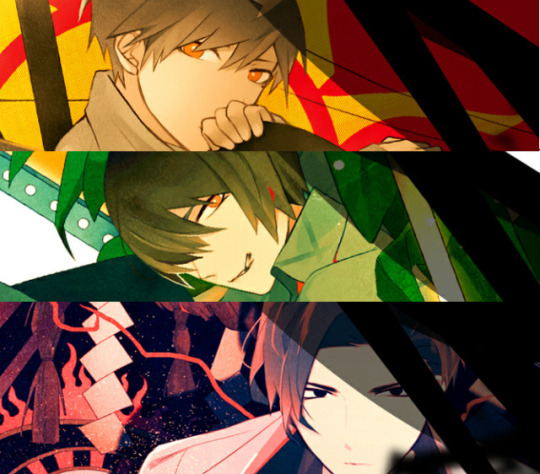
Story Uuultra C's story takes place in the second half of Japan's Showa era (the 1970s). It focuses on the Tokusatsu movie genre, in which superheroes fight monsters (kaiju). In this world however, kaiju and heroes aren't just characters you see in movies, they also exist in the real world. These kaiju usually look identical to humans, until they transform into their monster forms, which often happens when they experience severe emotions and lose control of themselves. The hero siren gets set off at any sign of a kaiju attack, alerting the ‘’heroes’’ called Icarus, that it’s time to defeat them.
Unlike most other BL visual novels, this game has 3 different pairings and each episode focuses on one specific pairing. There are no choices, so you can just select an episode an enjoy the story! The second and third chapters are locked until you completely chapter one.The story is the same every time, you just see it from a different character’s perspective each time. I do recommend playing the second story before the third one, even though it’s technically possible to completely skip it and immediately play the third route. Also make sure to check out the extras menu, as cleaning certain routes unlocks new information!
Chapter 1
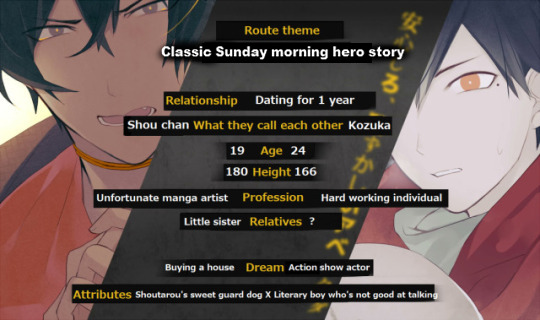
The first chapter focuses on the protagonist Kagome Shoutarou. His dream is to become an actor like his idol, Sayashi Juurou, who plays one of the most popular heroes on TV: Icarus. Shoutarou is in a relationship with Kozuka Akira, an aspiring manga artist. They live together in the Setagaya ward of Tokyo. Even though Shoutarou wants to become an actor, nobody usually calls him back after the auditions, which is why he currently has all kinds of other unrelated part-time jobs. Akira always disappears when the hero siren goes off and Shoutarou wonders what Akira has been hiding from him... The theme of his route is supposed to be like the superhero shows they would show on TV every Sunday morning!
Chapter 2

This route focuses on Choutsugai Shirou, a camera man who also graduated from law school. He's not just any photographer, he also works for several gossip magazines and isn't afraid to show his own selfish desires. He also hates Icarus because nobody came to save his family when they were attacked by a kaiju in the past. When he was younger he starred in a movie together with Sayashi Juurou and his childhood love "Belle-chan". Choutsugai is convinced Bell-chan is a girl but when they reunite he realizes that "Belle-chan" is actually a man called Isshiki Suzu. Isshiki is a kaiju who pretends to be a fake white icarus. He always shows up when a kaiju is spotted, but his intentions are unknown. He is a kind and caring person who wants to protect Shirou. I believe the theme is a reference to Kaiki Daisakusen (Mysterious Strategy), a supernatural mystery show whose protagonist is also a detective called Shiro.
Chapter 3
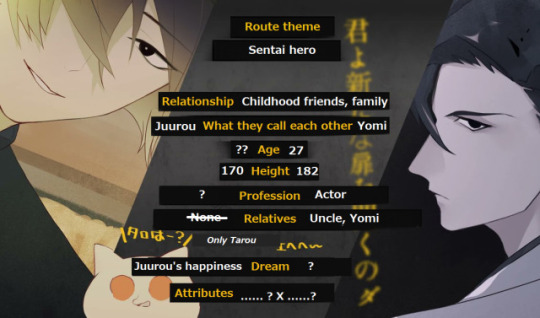
The last chapter focuses on famous Icarus actor, Sayashi Juurou, who is mentioned a lot in the previous chapters. Many people look up to him, but he has many dark secrets. Juurou often meets up with his childhood friend Yomi, who he met after a tragic accident when they were kids. Juurou’s uncle raised both of them together after this incident. Yomi has a lot of part time jobs and seems to be very busy, which Juurou doesn't really like because he just wants to be together with him. Yomi is a very mysterious character, his real age is unknown and he seems to know way too much about certain topics, not suspicious at all of course!.... The theme of this route is a classic Sentai hero theme, or at least that is what they want you to believe.
Personal thoughts This game is quite difficult to summarize because I feel like so much happens within so little time and I also don’t want to spoil the plot! There's also quite some side characters who all have their own stories too who are quite relevant in some of the routes. The characters are really nice and likable, although the plot might be a bit difficult to understand at first because so much stuff is happening at once. You really need to play all three chapters before you know what's really going on! In the end, I think my favorite pairing is probably the one featured in the final route (Juurou and Yomi), but I also really liked many of the other characters, they all have their own charm.
The game is not super long (I finished it within 12 hours) but it somehow feels longer because so much happens and it definitely has some replay value as well. I heard this game has over 1800 (!!) CGs which is why it sometimes feels like you’re reading a manga rather than a visual novel. The OST of this game was also amazing, according to the credits Kurosawa Rinko created most of it themselves which is really impressive, considering they’re also the scenario writer and artist. Definitely a completely different genre than Hashihime, but absolutely worth checking out.
I really recommend checking the official website and reading the short stories as well, which I created a list of in another blog post. There’s also a Q&A which answers some of the questions you might still have, as well as the supplementary reader which also has some additional information. Most of this content hasn't been translated, but if you have any questions about the game I would be happy to answer them if you send me a message! The supplementary reader has this really beautiful cover featuring Yomi and Juurou, I’m a big fan. If you’re interested in buying the digital version, it’s currently available on Adelta’s Booth account!

24 notes
·
View notes
Text
I’ve seen some people who finished Omori talking about how they don’t understand the game’s plot, what happens in the good ending or why the protagonist even decided to change his ways. So then, here’s my thoughts on Omori’s story.
Warning: SPOILERS AHOY. Only read this if you’ve already finished the game and seen the good or true ending. Or if you don’t plan on playing the game at all but still want to know the whole story.
I’ve seen some people around the internet talk about how Sunny’s character isn’t clear to them or how they feel Sunny doesn’t deserve a good ending. Here’s some thoughts I have on why I think Sunny’s growth was well depicted.
There’s two main routes you can go through in the game: the “Reality” route and the “Hikikomori” route.
In the “Hikikomori” route, Sunny stays in Headspace forever and we get to learn many additional details about him. Sunny’s parents are implied to have known what Sunny did to Mari all along. It’s also implied that Sunny’s mother covered the whole thing up and chose to present it as a suicide as well cus, in her own words, she can’t bear the thought of losing both of her kids.
Sunny’s mother insinuates her son isn’t a “good boy” even though she begs him to be good but she still sees him as her little boy (as seen by the overly-sweet and positive messages she leaves around the house and her voice mails) and needs him alive so she can survive her own grief. Sunny’s father is shown cutting down the hanging tree and telling Sunny he isn’t his son, presumably disowning Sunny. The father keeps being absent forever afterwards.
Fast forward to the present and the “Reality” route, Sunny’s moving in 3 days. He knows his time is up in the real world and the biggest catalyst for his personal growth is that he’s finally seeing his old friends in the REAL world after 4 years of only seeing their loving, idealized child version in dreams. For the first time, he gets to witness the collateral consequences of what he did to Mari in his now teenaged friends: Aubrey spirals into delinquency after feeling like she was thrown aside by everyone she loved. Hero is guilt ridden, can’t even go near Mari’s grave and gives up on his dreams of being a chef. Kel wants to make things better but feels powerless, useless and like a screwup. Basil lives in a miserable state of almost constant fear and psychosis.
Sunny finally gets to see the huge toll his lie took on his friends’ entire lives as they keep blaming themselves for not knowing about Mari’s supposed suicidal ideations. He’s finally forced to face reality and he still tries to hide in dreamworld but he can’t. The inhabitants of Headspace are all people or fictional characters he knows or likes in real life (that he changed in his dreams, like how Kim’s brother is a sweet gentle giant and Sweetheart looks just like the candy shop owner at the supermarket) and their quests end up leading him to events where he’s reminded over and over again his dreams will end soon (the end of the underwater highway, the tree near the whale, the shadows of Mari and Basil) and that he needs to delve into Blackspace.
This shows how his own subconscious mind knows well what needs to be done; he’s putting the mental and emotional effort of making himself face what he’s done, shown through the contrast between the whimsical nature of Headspace and the dark surrealism of Blackspace.
As this happens in Sunny’s psyche, in the real world he can try to “atone” a bit by doing good things for his little community like completing requests people around him have. He still has a lot of trouble being near Basil in the real world but considering his entire subconscious mainly revolves around finding and rescuing Basil, he wants and needs to face Basil sincerely before he runs out of time.
We’re shown through memories that Sunny’s personality was always quiet, wary, a bit distant and very bad at dealing with pressure. Some people even describe him as cowardly or mediocre but he was just a small kid who’s entire world ended when he was 12. Since then, he never left his house, spending most of his days asleep rather than awake. It’s no wonder his personality isn’t as developed as his friends. His friends, although they were also in immense pain, at least still continued to live beyond Mari’s death. Sunny didn’t. He only lived through sleep.
Subconsciously, it’s shown Sunny both loves and hates Basil. This is seen in Blackspace with the dialogue he has with the “strangers” walking in the void. They talk about how Sunny (as Omori) does horrible things to Basil in the darkness of Blackspace because he struggles with facing the truth of his own actions. It’s also revealed through datamine of Blackspace’s metaphorical photo album that Basil, in his attempts to save Sunny from the judgement of others and to get him to come out of catatonia, was the one who come up with the plan to hang Mari.
Sunny describes Mari as looking as if calmly asleep when he drags her up the stairs. Her eyes remained peacefully closed until Sunny and Basil hung her. Then, Sunny turned back to look at Mari’s corpse, her previously closed eyes were wide open. She might have even been still alive, might have opened her eyes during or after the noose was tied to her neck. Or the belief he saw her eyes open could have been a manifestation of Sunny’s guilt, instead.
Either way, the horrifying possibilities surrounding Mari’s death lead to Sunny handling his emotional pain by subconsciously taking it out on Basil. It’s why Basil in Blackspace is shown constantly suffering and dying in many different ways. It’s the only way Sunny has been able to deal with himself; by forcing Basil into the darkest corners of his mind, his perfect colorful dreamworld can’t be ruined by the ugly reality Basil’s mere presence represents. It’s less painful to try to forget Basil and to forever blame him for both of their sins.
Still, even with all these conflicted feelings, Sunny’s tried to come to terms with love he still feels for Basil many times before. The shadows point out how this isn’t the first time he’s tried to save the Flower Boy; how all the previous times before ended in Sunny failing to find redemption and so his mind turns back to torturing the Basil of his dreams instead.
However, one of the Blackspace shadows also mentions a very important detail that changes almost everything this time around: his time is almost up in the real world. Whether this means he’ll commit suicide or move away, it’s almost time for him to leave the friends he’s always loved so much behind.
Sunny is forced to do a lot of internal work and self-reflection in what little time he has left. It’s shown through his dream actions, the surreal imagery surrounding him and the characters with all the sub plots his subconscious makes up.
In the route to the good ending, he traverses Blackspace and manages to listen to every harsh truth Basil’s shadow has to tell him. His attempts to save Basil mean he’s fighting his own mind, forcing himself to accept the truth.
To achieve redemption for his greatest mistake, Sunny needs to start with accepting Basil entirely; he has to stop making Basil take the brunt of their combined regrets. It means being willing to finally face the REAL Basil instead of permanently burying him in the most painful place within Sunny’s mind.
So basically, it’s obvious to me that Sunny is forced out of his “comfortable” hikikomori misery the moment he opens the door to meet the REAL Kel.
Sunny and Basil have a confrontation in the real world. When Sunny entera Basil’s room, we see poor Basil suicidal and at his limit. He’s clearly in the throes of a psychotic episode and at the mercy of hallucinations and delusions he can’t escape from (“There’s no way out of this is there, Sunny?”). Basil attacks you in an attempt to save you by killing the “thing behind you” but as we know, there isn’t actually something behind you.
There was never any monster to take the blame for Basil’s regrets, nor yours. It’s always been just you.
Meanwhile, Sunny is trying his best not to completely lose his shit so he can save Basil and stop him from potentially killing the both of them. Sunny likely loses an eye in the fight, shown by the blood coming from your socket and the bandage over it in the hospital.
Incidentally, the eye you lose is on the same side as the eye that can be seen peeking through the hair of Mari’s face as she’s hanging from the tree.
In the good ending, the song at the end talks about how even after confessing the truth, Sunny is alone once again, so it’s not actually clear if Aubrey, Kel and Hero actually forgave him. I feel like this is deliberately left up to interpretation by the writers. The lyrics then continue on to say Sunny still finds it hard to wake up, still finds himself plagued some days with lingering regret, but that he still tries to take it all one step at a time to carry on living.
With the song’s lyrics in mind, the end scene that shows Basil and Sunny smiling at each other while Mari’s shadow leaves them doesn’t mean they’re completely fine all of a sudden. Whether their friends forgave them or not, they at least finally have the relief of honesty. The burden of their unbearable shared secret is now off their shoulders. It’s finally out in the open, which means they both can now start healing and working to find the redemption Sunny was looking for in Blackspace. It also means they can go back to loving each other again without the crushing pain they both felt in each other’s presence.
I agree that Aubrey and the gang get pretty left out in the good ending, though. I wish there was more of them and their reactions to the truth BUT I think it’s sadly a deliberate choice by the writers to leave their reaction up to the player’s interpretation. This can feel extremely unfulfilling to many people (me included, I hate when authors do that tbh) but also to many others that’s a good thing cus they get to apply their own personal meaning and feelings.
I personally feel like the friends forgiving Sunny and Basil right off the bat would be incredibly unrealistic. I think they would need a lot of time (especially Aubrey) for them to forgive the lie that wrecked their lives for years. Forgiveness isn’t impossible but it would probably come in the form of a slow, difficult, heartbreaking process. Bittersweet.
Redemption isn’t just about forgiveness, anyway.
Even if a person is never forgiven by the people they’ve hurt, they can still find redemption for their actions through doing good for the people around them and the world at large. An example of this is shown through what Sunny can do on his last days in his neighborhood. The gratitude and additional flowers he receives in the hospital from each person he’s helped are proof he can still do good for others even after something as horrible and unforgivable as accidental murder. In a way, it’s proof that his life is still worth living.
But ultimately that’s just my own interpretation of the ending and I understand other people would interpret it all differently. Some see forgiveness as a given in the story while there’s also others who think Sunny doesn’t deserve forgiveness or those who think Sunny is a sociopath/psychopath or that Basil is the true villain of the game. I think this is why the ending was left so open, to favor all the different interpretations people have of it.
ETA: Here’s a different take on Sunny’s parents. This post argues that, despite the initial implications, they actually didn’t know about the attempted coverup. It’s a really good writeup explaining the whys and hows and has me reconsidering that part of the story!
https://www.reddit.com/r/OMORI/comments/kr9nvx/major_spoilers_regarding_sunny_his_parents_and/?utm_source=share&utm_medium=ios_app&utm_name=iossmf
#omori#omori game#omori sunny#omori basil#omori spoilers#spoilers#i said id wait before doing a post like this lol#but here i am#omori meta
727 notes
·
View notes
Text
Yu-Gi-Oh! Sevens is the best YGO animated series since season 2 of Yu-Gi-Oh! GX. Maybe best overall.
Sevens just finished this week, so that’s why this post exists.
Sevens did so many things better than basically any of the other YGO series:
* The main protagonist, Yuuga, doesn’t win every single duel (fuckin’ Yusei/Yusaku). He, in-fact, loses about half the time. Not just to bad guys, either. He’s lost to almost every one of his main friends group (sorry, Gakuto) at least once, and to some secondary characters besides. There’s very little enforced hierarchy among the main group of good guys. Everybody gets involved, and everybody contributes. They don’t just wait for the main hero or the rival to show up (a la YGO GX season 4). Their joke character is also very much established to be bloody useless and unlikeable outside of dueling (we aren’t expected to consider them cool, like we supposedly were with Crow).
* The supporting tertiary cast is HUGE, but a tremendous effort is made to keep them involved, and give them things to do. The main cast will routinely seek assistance from minor characters with different specialities that they themselves don’t have, rather than the minor characters always begging this one small group for help.
* Romin, Asana, and Tiger (the three most prevalent female characters) are very much not there to be bystanders (unlike Anzu, Asuka, Post-season-1 Aki, Kotori, Yuzu, Aoi). They’ve all beaten Yuuga, and they have a bunch of on-screen wins each (unlike Mai, who despite being recognised as a strong duelist in-story has only on-screen wins that are; a filler episode, and a win-by-forfeit against coming-off-an-already-strenuous-duel-and-faints-before-the-duel-would’ve-ended Jonouchi). All three of them have their own separate business that they take care of, and their own ideals to follow. They’re not ducklings following the main protagonist on his adventures alone.
* Heck, the entire cast (sans Luke) spends most of their time concerned with things that aren’t dueling. They like dueling, and their desire to save it drives most of the overarching plot, but they have others things going on too.
* Maximum Summoning is what Union monsters should have been this entire time. And the new spin they gave to Fusion Summoning is vastly more entertaining than any previous efforts.
* By design, duels don’t devolve into “I’ll play this one card, which somehow has three abilities over twenty lines of text, and then do the same with two more cards, and this one turn will last half the episode and somehow leave me with many more cards than I started the turn with”. The ridiculous solitaire-esque nature of previous series’ has been essentially done away with, and for good reason. Duels are simpler, but more fun to watch.
* The quote-unquote ‘villains’ do generally win their first few duels against the heroes, but villain decay usually sets in pretty quickly. It’s actually not a negative, though, as it ties into the series-wide narrative that these are children, and they are playing games. As previously stated, the secondary characters still tend to be given something to do that doesn’t just become “appear in group shots while the 'big three’ duelists fight all the battles” - Neil basically runs the city, acting as a mission control who is recognised by all characters as essentially the smartest guy around to consult on intellectual issues. Asana and her construction-crew-themed followers both literally unearth secrets and assist in building gadgets. Roa is devoted to his music even more than his dueling.
* It’s genuinely fun to watch almost all of the time, unlike most of GX, most of 5Ds, most of Zexal, ALL of Arc-V, and especially ALL of Vrains.
14 notes
·
View notes
Text
So I had a dream about a fictional RPG so I made a fake Wikipedia article for it with as much detail as I could remember from the dream and some extra stuff
enjoy this mess

Summary
Eternal was a 1997 role-playing video game developed by Nintendo and released on the Game Boy. The 2021 remake of the game, Eternal Rediscovered, was released on the Nintendo Switch.
The player controls an unnamed protagonist who is the lost prince of the fictional kingdom of Eterna who works to reach his kingdom to regain his title. There are achievements in game for several goals which can unlock a total of 3 endings, changed to 5 in the remake.
Eternal released to critical acclaim but was said to be overshadowed by various Nintendo products of the time.
Gameplay
Eternal is played in a third-person view with an overhead perspective. It includes three screens - an overworld screen, a battle screen and a party screen where the player can configure themselves and their companions.
The player recruits three different types of companions, humans, cave dwellers and monsters, each with their advantages and disadvantages, with 8 being recruited by the main storyline, 5 being recruited by encountering them in the overworld, and 3 being code exclusive.
Battling follows a typical RPG turn format, with moves being categorised by three types: Attack, Support and Divine. Attack type moves deal damage to the opponent, support type moves directly affect the character and/or the party, and divine type moves combine both types, but can only be used by certain characters.
Achievements can be unlocked in game, and the ending varies depending on which achievements were unlocked, which increases the length of the story. These are the Locked Ending, the Friendship Ending and the Real Ending, which can be achieved by gaining all companions (excluding code exclusive ones) and defeating all of the monster bosses excluding Dae.
Plot
The 16-year old protagonist begins in the small farming town of Collis in the country of Somn. After finding a letter in their late father’s house, they learn their true origins and how they must seek out the kingdom of Eterna to claim their rightful place as prince.
Early into their journey, the protagonist meets a cave dweller called Prim who saves them from being eaten by monsters and becomes the first companion of the prince, which introduces the player to the mechanics of fighting and companions as the protagonist is given their first weapon.
Along his journey, the prince recruits companions to help him find Infidel and fights the demon Dae, his monster minions and his brainwashed victims.
Depending on the achievements of the player, the Prince has three different fates, which are being locked up for eternity by Dae, deciding not to return to Eterna and live with his companions, or take his rightful place on the throne. These are referred to by fans as the Bad Ending, the Romance Ending and the Good Ending.

Summary
Eternal Rediscovered is a 2021 remake of Eternal released on the Nintendo Switch by Nintendo.
Due to its move to a stronger and more powerful console, Eternal was changed to an open world game inspired by previous titles on the Switch such as Breath of the Wild, and more detail was given to its characters, lore and achievements.
Eternal Rediscovered was as critically acclaimed as its predecessor due to the graphic change and new options given to players.
Gameplay
The game follows the same core gameplay as the previous game, now in an open world environment with immersive nature and monsters. However, it now grants the player the long-awaited ability to romance companions of any species or either gender, leading to many popularity polls amongst players and official staff.
The achievements were also changed, where players could gain new achievements for finding special weapons and items, and romancing companions, which could lead to the Adventurer Ending and the Beach Ending respectfully under specific conditions. The Real Ending of the previous game was changed to the Good Ending, and the Real Ending is given to a player who achieves every achievement in one playthrough.
Plot
The game follows the same plot as its predecessor, introducing mechanisms to the player as they travel around the country of Somn.
3 notes
·
View notes
Note
What is your opinion about the Maidens in RWBY and their importance?
Hello anon!
I like the Maidens and especially how they explore two main ideas:
1) The concept of cycles and generations.
2) The trope of the chosen one.
THE CYCLE OF SEASONS
I think it is clear Ozpin created the Maidens partly because he wanted guardians and partly as a way to grieve his four daughters. He has symbolically dragged them into the cycle with him and Salem.
In a sense, the story keeps repeating. Salem kills Ozpin, he is reborn and his daughters are victims of the conflict between them.
Because of this, the four Maidens have become one of the many symbols of this endless cycle, which is clealry breaking its protagonists more and more.
This is well conveyed by the Maidens having a season theme. Seasons are in fact linked to the repetition of time aka one of Ozpin’s motifs:

At the same time, the idea of an older woman passing the torch to a younger one can be easily read as a metaphor for a mother-daughter dynamic. This is not always the case, but so far this interpretation is important for two of our four Maidens:
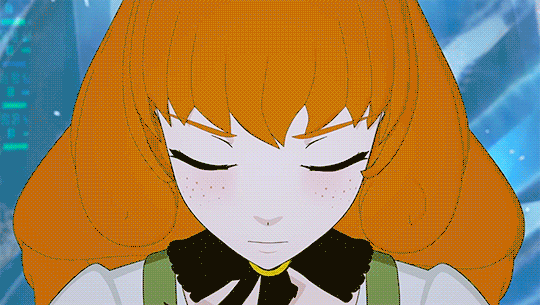

Penny receiving the Maiden’s powers from Fria is important on multiple levels and it plays on Penny alluding to Pinocchio. Fria (The Blue Fairy) recognizes Penny as a real girl, something she has been struggling with since the beginning:
Penny: Ruby... I'm not a real girl.
And is still struggling with:
Cinder: I don’t serve anyone. And you wouldn’t either, if you were built that way.
That said, Penny is not only struggling with enemies that consider her a robot, but also with the (understandable) overprotectiveness of people who love her:
Pietro: I lost you before. Are you asking me to go through that again? No. No. I want the chance to watch you live your life.
Penny: But dad… I am trying to.
She is not only a robot, who wants to prove she is a real girl, but also a daughter, who wants to grow into her own person.
This idea is made even stronger by Penny having been “created” through Pietro’s aura. She is a part of Pietro becoming someone completely different and independent from him. Still, isn’t it what all children are?
Raven is instead Penny’s opposite since she is not a daughter, but a mother. Not only that, but she is a mother, who fails three times.
She fails her biological daughter Yang by abandoning her and putting her in danger.
She fails Vernal, who dies for her.
She fails the previous Spring Maiden, who clearly looked up to her and was betrayed:
Cinder: Vernal was a decoy the whole time. The last Spring Maiden must've trusted you a great deal before she died. I bet that was a mistake...
This is well conveyed by Raven’s case being the opposite of what should ideally happen. Normally an older Maiden should pass her power to a younger girl, so that the cycle keeps going and that a new generation can keep fighting for good. However, Raven steals the powers of the Maiden for herself, just like she uses her shape-shifting ability for selfish objectives:
Ozpin: Everyone has a choice. The Branwens chose to accept their powers and the responsibilities that came with them. And later, one of them chose to abandon her duties in favor of her own self-interest.
She presents herself as a mentor for young women, but in the end she is a failure because she is too self-centered.
In conclusion, Rwby is both a coming of age story and a story that deals with cycles. Let’s think about the many abusive cycles in the story or the damaging cycles present in society, for example. All these cycles need to be broken and I would not be surprised if this will be the case for the cycle of the Maidens as well.
THE CHOSEN ONES
Up until now, the person who should be a Maiden never becomes one.
a) Pyrrha was destined to be the Fall Maiden, but Cinder stole the power.
b) Vernal is foreshadowed to be the Spring Maiden, but Raven turns out to be the real one.
c) Winter has been preparing herself to inherit the Winter’s Maiden’s role, but Penny is the one chosen by Fria.
Why is that so?
The story is clearly playing with the idea of the “chosen one” and asking some questions.
Are people chosen by destiny:
Cinder: It’s unfortunate you were promised a power that was never truly yours.
Or do they choose it?
Red-Haired Woman: She understood that she had a responsibility… to try. I don’t think she would regret her choice, because a Huntress would understand that there really wasn’t a choice to make. And a Huntress is what she always wanted to be.
What if the chosen person is the wrong one?
Lionheart: She was determined, at first, when she inherited her powers, but the weight of responsibility proved to be too much for the child. She... ran. Abandoned her training, everyone. That was over a decade ago. There's no telling where she could be now.
Finally, is it even right to choose a person?
Weiss: Doesn't it bother you? He practically groomed your entire military career.
Winter: It did at first, when the General first proposed it to me. But the more I thought about it, the more I saw it as a privilege, a chance to do some real good for Atlas. For Remnant.
Weiss: But your destiny was chosen for you, without your input.
So far each Maiden has explored this concept in a different way. Moreover, the story has highlighted many problems with the method used by Ozpin and his allies to select their guardians.
First of all there is the machine used to transmit aura:
Ironwood: We've made... significant strides. And we believe we've found a way to capture it.
Qrow: Capture it and cram it into something else. (gestures to Pyrrha as she takes a second to realize what that means) Or in your case ...
Pyrrha: (to Ironwood) That's...
Ironwood: Classified.
Pyrrha: ... wrong!
This method has been presented in-universe as sketchy and unethical both for the person who is having her aura taken and for the person receiving it.
It is also interesting that this machine is basically the technological equivalent of the Grimm used by Salem and Cinder to steal the powers in the first place:

One is the product of destruction (The Brother’s Grimms), while the other is the result of creation (in-universe technology is linked to creation). However, they both do essentially the same thing. They steal another person’s aura and change the one absorbing it:
Raven: You turned yourself into a monster just for power.
Secondly, there is the fact that so far several Maidens have died or have been targeted in horrible ways.
Some of them were specifically attacked because young and less experienced than others, like Amber. Some others made their choice without truly understanding it, like the Spring Maiden. And some of them. like Pyrrha, were not even given all the elements to make an informed choice.
In short:
Hazel: You send children to their deaths for a cause that you know has no victory, no end!
It is true that Hazel is a hypocrite that feels anger for Ozpin sending students to their deaths only to be the one killing them. It is also true that he does not respect his sister’s choice:
Oscar: Did she know the risk of being a Huntress?
Hazel: She was only a child! She wasn't ready!!
Oscar: She made a choice! A choice to put others before herself! So do I.
However, the narrative harshly criticizes Ozpin for not giving people all the information, “the knowledge”, they need to make that choice:
Yang: There was so much you hadn't told us! How could you think that was okay?!
Finally, we arrive at the current volumes where we see how Ironwood has tried to control Penny, Winter and Fria aka all the three people involved in the passage of the Maidens powers...only to fail miserably.
And in this failure probably lies the true mistake which has been made over and over again. The whole point is that probably the whole cycle (thematically) can’t and should not be controlled to this extent:
Goodwitch: At first, the only thing that was certain was that the powers were specifically passed on to young women. But as time went on, it was discovered that the selection process was much more... intimate.
Pyrrha: ... Intimate?
Goodwitch: As we understand it now, when a Maiden dies, the one who is in her final thoughts is the first candidate to inherit her power.
The powers are passed from a person to another through emotions. It is not by chance that the last person in a Maiden’s mind is the one who gets the power. It is because the power is linked to emotions and to ties and you should not try to weaponize them.
MAIDENS AND RELICS
Finally each Maiden is clearly linked to the theme represented by her respective relic.
Pyrrha and Cinder are both linked to the idea of destiny and choosing. I have shared some thoughts on them here.
I would say that Cinder wants to be chosen. She wants to be special and to be given value. This is probably why she is serving Salem. It is because Salem has chosen her for an important role:
Salem: When I chose you as my vessel for the Maidens, I put my trust in you.
This is not positive. It is dehumanizing:
Salem: This game is not yours to win, Cinder, it’s mine. Just because you’re more valuable to me than a pawn, does not make you a player.
But Cinder sees this as a chance.
Pyrrha is instead a person, who chooses her own destiny:
Pyrrha: When I think of destiny, I don’t think of a predetermined fate you can’t escape. But rather… some sort of final goal, something you work towards your entire life.
In other words, Pyrrha has an active role in her own destiny, while Cinder so far has accepted it passively.
This might seem ironic because all in all Cinder has been a pretty active character. She was born as nothing and fought to free herself and to become more powerful. However, she is still leaving her own life in the hands of another person, who is specifically coded as an abusive mother-figure. It is probable that her arc will be about taking back the agency Salem is clearly stealing from her.
This might very well be why she is the Maiden of choice. It is because in the end she’ll make an active choice to get her own freedom back.
At the same time, Pyrrha being active in her choices still leads to her demise. This is because she represents a choice without knowledge, as I have stated in the meta linked above:
She had been explained only a fragment of the truth, while the whole point is that one should learn, meet creation and destruction and then make a choice. This is why we have yet to meet the relic of choice.
As a matter of fact it is clear that knowledge and choice are complementary, just like destruction and creation.
This is highlighted also by their respective relics. On one hand the Lamp offers knowledge of the past. On the other hand the Crown gives its user a vision of a future choice.
This is because one has to know the past to change the future:
Bartholomew Oobleck : History is important, gentlemen! If you can't learn from it... you're destined to repeat it.
In a sense, knowledge is the passive condition of choice, while choice is the active goal of knowledge.
This is why one needs both to contribute to the world in the most effective way possible. If one acts without knowledge they might make the wrong choice. At the same time, knowledge without choice is just passiveness, as shown in The Indecisive King fairy tale.
Too much knowledge might lead to indeciveness or even cynism. This is why Raven is the Spring Maiden. It is because she is Pyrrha’s opposite aka knowledge without choice:
Yang: Which is it, mom? Are you merciful, or are you a survivor? Did you let me walk into that trap because you knew I could handle it, or because it meant you could get what you wanted?!
Raven keeps making decisions only to run away from them immediately after. Knowledge did not make her braver, but just a coward.
Finally we arrive to Penny and the idea of creation.
I have mentioned Penny in the meta linked above:
Penny is an artificial human, a creation who was given life because her father loved her so much that he sacrificed a part of his aura for her… twice. She is at the centre of the theme of creation and it represents the good sides of it. She is a creation with a soul, a child, the fruit of parental love. It is because of the love she received that she is willing to protect creation.
Penny is at the centre of the theme of creation in two ways.
a) She is a child, who wants independence.
b) She is a good declination of technology.
On one hand children are new lives that join the world. They are the embodyment of creation.
On the other hand technology is an expression of human creation and a way humans have to change and influence reality.
Penny is both. She is Pietro’s girl and a robot with a soul:
Pietro: When the General first challenged us to find the next breakthrough in defense technology, most of my colleagues pursued more obvious choices. I was one of the few who believed in looking inward for inspiration.
Ruby: You wanted a protector with a soul.
Pietro: I did. And when General Ironwood saw her, he did too. Much to my surprise, the Penny Project was chosen over all the other proposals.
Ironwood choosing Pietro’s project over others is very interesting and ambiguous. Did he choose this project because at the time he understood the importance of “a protector with a soul”?
Probably consciously yes, but the way he has treated Penny since volume 2 suggests also something different. It suggests a desire of domination. The idea that putting a soul into a metallic body would make it easier to control it.
After all:
Ironwood: For the past few years, Atlas has been studying Aura from a more scientific standpoint; how it works, what's it made of, how it can be used. We've made... significant strides. And we believe we've found a way to capture it.
Each one of humanity’s gift has another side of itself. Knowledge can lead to fear and choice is linked to passivity/agency. When it comes to creation, this gift brings with itself the temptation of control.
Why shouldn’t a creator “own” theis creation? Why shouldn’t they be entitled to it? Why should they share it with the rest of the world?
If one looks at Ironwood, at Atlas and at the other protagonists of this volume this way, a lot of things resonate.
Atlas is the most technological advanced kingdom, but instead of sharing its resources it closes off. Ironwood’s embargo is just another declination of this same idea of losing control.
Similarly the Ace Ops and Winter are all repressing their emotions. They want perfect control over themselves. They are taught they should be like drones.
Technology itself is often misused by the characters. Technolofy should be like Penny. It should have humanity and a soul, but Ironwood likes it because he sees it as something logical that can be controlled (and of course he keeps losing control over it). Ironwood wants to become like he thinks Penny is aka a controllable soul. He fails to understand that Penny is special because she has her own free will.
Finally, this same desire of control is present also in familial relationship. It is not by chance that the Schnee Family is in Atlas. Weiss’s story has always been about exploring this specific idea of a family. A family, which is cold and controlling, just like ice. Weiss’s arc is about melting this ice, in herself first and now in others as well.
Technological control and the control of people. In short, the control over two aspects of creation. This is the the idea Atlas represents and this is why it is currently falling.
In short, the creation must be free and it is not by chance the world is in its current predicament because the Gods tried to control their creations with disastrous results.
CONCLUSION
These are my main thoughts on the Maidens so far. That said, they might chance since the story is far from over as the arcs of all the maidens we have met so far.
As a final note, I find interesting that so far none of our four protagonists is a Maiden. It is an interesting choice and I think that it lets the series make a good use of its ensemble cast.
That said, I wonder if our four protagonists will end up calling back the original Four Maidens instead.
The fairy tale is interesting on multiple levels.
In-universe, it is interesting because it tells us something about how Ozpin was probably inspired by the original Four Maidens to try to save the world again. Ozpin is inspired by four normal people, who are just trying their best to help others.
This is a recurring idea in Rwby and this might be why none of the four protagonists has been selected to be a Maiden yet.
If read as a stand-alone, the story is an interesting tale on how to overcome depression.
The story starts with the old man closed in his house and it shows how he progressively opens up until he himself is able to help others.
Winter is the one who teaches him how to work on his own interiority even when the world is cold.
Springs prepares the terrain for him to come out. It makes the garden more welcoming. It is like when a person has to find the right environment to open herself up.
Summer is the one who finally drags the man out and gives him energy.
Finally Fall is the one who makes the man realize he can now share his new found energy with others.
Theirs is a virtuous cycle and I would say it is very different of the tragic cycle that sees the current Maidens as protagonists. Who knows? Maybe it is about going back to that virtuosity.
Thank you for the ask!
#rwby#rwby meta#maidens#cinder fall#raven branwen#penny polendina#pyrrha nikos#asksfullofsugar#anonymous
188 notes
·
View notes
Text
Spring 2021 Anime Season
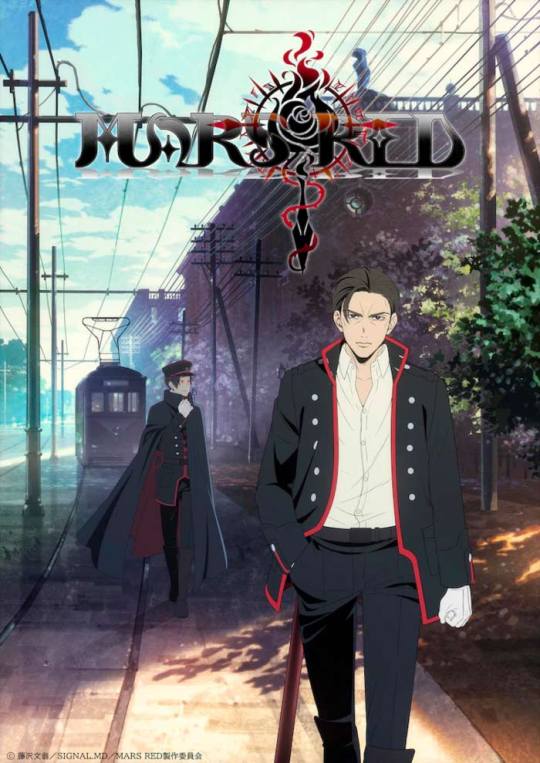
Mars Red is one of two series this season set in one of my favorite periods, the Meiji era. It’s a vampire series that deals a lot with the politics of war as the Japanese military is attempting to establish a vampire unit, supposedly to compete with the British vampire unit (because of course that’s a thing). It focuses on a human military officer named Maeda who is charged with recruiting and managing vampires. Maeda is the type of character I really enjoy. Handsome, a little older than most anime protagonists, chain-smoking, overly serious, and voiced by Junichi Suwabe (who has to have the sexiest voice in all of anime). The series has a classic, romantic feel to it. Its take on vampires is somewhat traditional (they evaporate in the sun, drink blood, sleep in coffins, have super strength and speed, etc.). If it brings anything new to the table, it’s the concept of vampires having different ranks, from S-class down, and how lower ranks naturally fear higher ranks. Still yet, the classic vibe works in the show’s favor. Combined with the historical setting, it gives the show a certain charm. The art is lovely, from the backgrounds to the character designs, and the music is a high point. It easily has the best ending theme of the season.
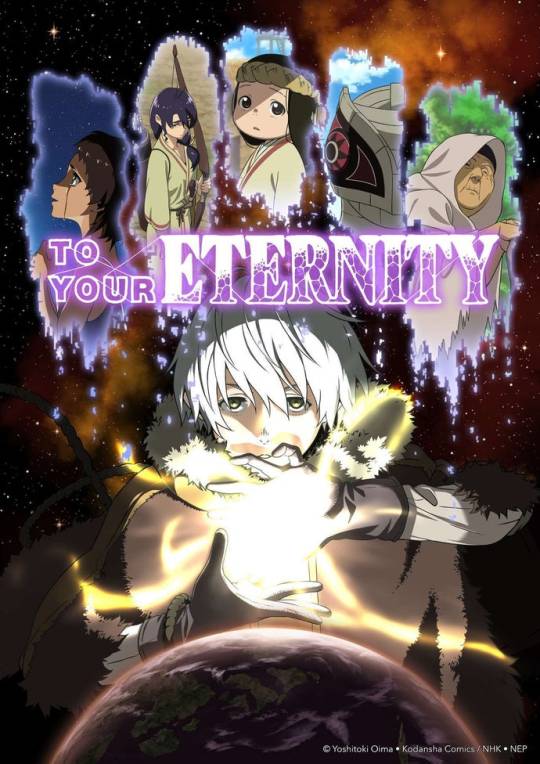
Fumetsu no Anata e (To Your Eternity) is a unique series. I’ve seen a lot of people comparing it to Mushishi, but with an overarching plot, and that assessment is pretty accurate. The show follows an entity that comes to be known as Fushi. It begins as an orb, and as it makes contact with other objects and creatures, it learns from them and can possibly take their forms. Among the forms it most often takes are a white wolf and a young man. Originally, it’s a somewhat empty shell, incapable of communicating, but as it meets different creatures and learns, it develops a personality and begins to speak. The series is, overall, about Fushi’s journey through this world and all the experiences it gains, both wonderful and tragic. There’s a subtle beauty to the series, with an early focus on nature, but it also has scenes of trauma and violence. The animation is fluid and the facial expressions are amazing. There’s an overall natural feel to it that, like others have pointed out, reminds me of Mushishi (though it’s definitely faster paced than Mushishi). The show also likes to make you cry, so keep that in mind.
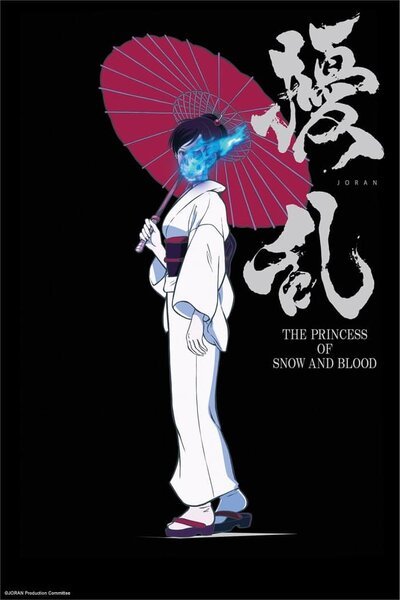
Joran: The Princess of Snow and Blood is the other series set in the Meiji era this season, albeit an alternate version of it that has a strange form of technology. To be honest, I’m a little fuzzy on some of the details, but it seems to be about a group called the Nue who work for the government to fight against a growing rebellion. The main character is Sawa, a member of Nue who has some sort of special powers involving her blood, which allow her to transform and battle monsters, or whatever else stands in her way. Her goal is to get revenge for the death of her entire clan (implied to be wiped out because of their power). Sawa is a decent heroine, a woman who craves vengeance and is determined to get it through any means, but is, at her core, a compassionate person who would rather live in peace. It’s this internal conflict that makes Sawa compelling (even if it’s not entirely original). The other characters are interesting, particularly Tsuki, whom I won’t talk much about because it would involve spoilers. The plot and details can get a little convoluted, but the action and animation are solid. When Sawa transforms, the art style changes, and it’s a really cool visual effect. The music is also nice.
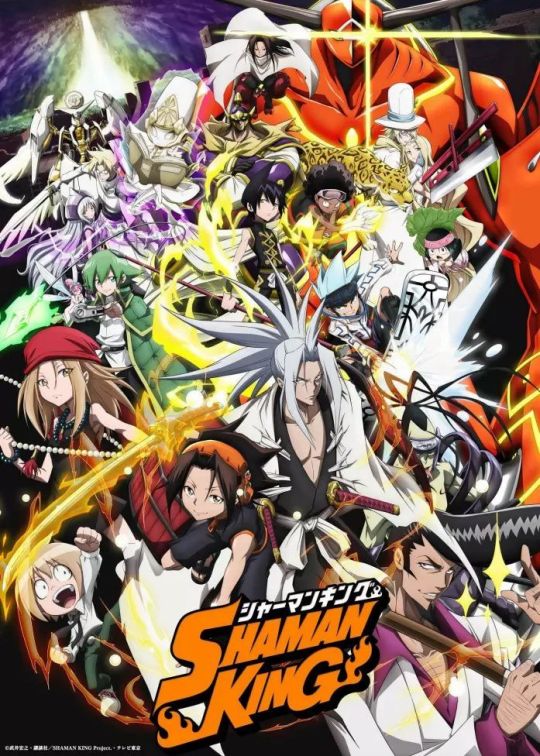
Shaman King received a remake this season. I was a huge fan of the original, and so far I’m enjoying the remake, but to be honest, I’m having trouble seeing the point. The art is almost the same (just a lot shinier), the voice actors are the same, the plot is the same. Maybe it’s just that it’s been so long since I saw the original, I’m unable to remember the details and so I can’t tell what’s different. But to me it feels like I’m just rewatching the show. Which is fine, because I loved it to begin with. Maybe it gets different later on. Maybe it more closely follows the manga. I’ll keep watching to find out. For anyone new to the series, it looks like the remake is a solid place to start if you want to get into it. I won’t go into plot details for a story this old, so I’ll just say it’s a top tier shounen fighting series with a unique art style and some very memorable characters. If you like that sort of thing, and missed the original (or you just want a refresher), definitely check it out!
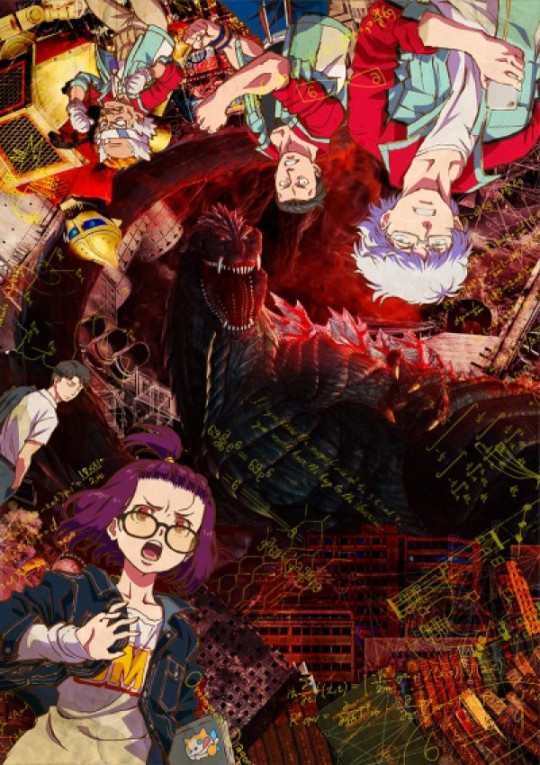
Godzilla Singular Point is a true delight. I’m a huge Godzilla (and kaiju in general) fan. I’ve watched every single Godzilla movie, as well as all the related movies (the Mothra films, Rodan, etc.), but I never watched the previous Godzilla anime that was on Netflix a few years ago. It just didn’t sound like something I’d like. Singular Point, however, is right up my alley. Set mainly in a small seaside town that’s suddenly attacked by bird-like monsters known as Rodans, we have two geeky protagonists using their intelligence to figure out what’s going on while more and more monsters appear. Mei and Yun are excellent heroes. They rely on their wits rather than physical strength, which is a refreshing approach. It’s also interesting that they have little to no face-to-face interaction. Instead, they chat with each other via text as they work separately. They often challenge each other with science questions. It’s adorable. The show’s overall feel is fairly upbeat and energetic. The colorful art and peppy character designs by Kazue Kato (who did Blue Exorcist) help with this feel. It should be noted that Godzilla himself doesn’t fully appear until halfway through the series. It says a lot about the quality of the show that I don’t actually mind that at all. Some of the science stuff does go over my head, but the general plot is easy enough to follow and the action is very well done. It also has fantastic music, with my favorite opening theme of the season. Even if Godzilla isn’t your thing, consider giving this series a shot if you like nerdy science types as heroes.
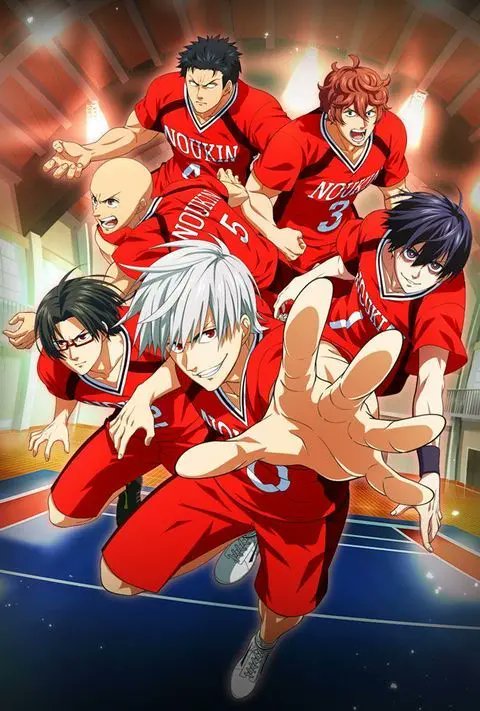
Burning Kabaddi is a sports anime about an unsual sport. I’d never heard of it before now, and if people in the comments were not talking about the very real sport, I would have assumed it was made up for the anime. The show is aware that the sport is obscure, so it takes great pains to explain the rules and details so that we can all follow the action. The story centers on Yoigoshi, a soccer prodigy who decides to drop all sports once he gets to high school due to all the drama and angst that surrounded him (mostly due to his teammates being jealous of his talent), and pursue a career as a streamer. All the various sports clubs at the school want to recruit him (especially the soccer club, of course) because they’ve heard of his skill and he has an athletic build. He rejects them all, but the Kabaddi club is strangely relentless. He ends up being manipulated into joining (the vice captain of the team straight up blackmails him by threatening to show his online streaming account to the whole school). Despite this rocky beginning, Yoigoshi actually starts to enjoy playing Kabaddi, and more importantly, begins to bond with his new teammates. It’s pretty fun stuff that doesn’t take itself too seriously. The art is serviceable for a sports anime and the music is fine. The series isn’t going to blow your mind, but it’s a fun way to spend twenty minutes every week. Worth a watch if you have a weakness for hot blooded sports anime.

The World Ends With You finally got its anime adaptation and I was so excited. The game is one of my all-time favorites. So far the anime is pretty good. The art is a near perfect replication of the bold, thick-lined art of the game. The battles are exciting and cool. Best of all, the anime often uses music from the game. This is important because the game has one of the best soundtracks, ever. Every time I recognize a song from the game, I almost squeal. If I had a complaint, it’s that the pacing feels a little off at times. It feels like the anime is rushing through the story, but that’s understandable. In the game, it took longer for everything to happen because you were walking from place to place, fighting battles along the way, stopping to scan NPC’s, shopping at stores, spending time in menus, etc. The anime has to cut most of that out, so naturally things are going to move faster. The result is that you don’t get to spend as much time with these characters, and so you feel less attached to them. Anyone watching the anime who didn’t play the game might feel like the emotional beats are lacking. I feel like this anime is definitely meant to be enjoyed by fans of the game, rather than newcomers to the story. But if you are a fan of the game? You should be watching this every week. It’s an excellent refresher on the story, just in time for the second game to come out this summer. Super high on my watch list.
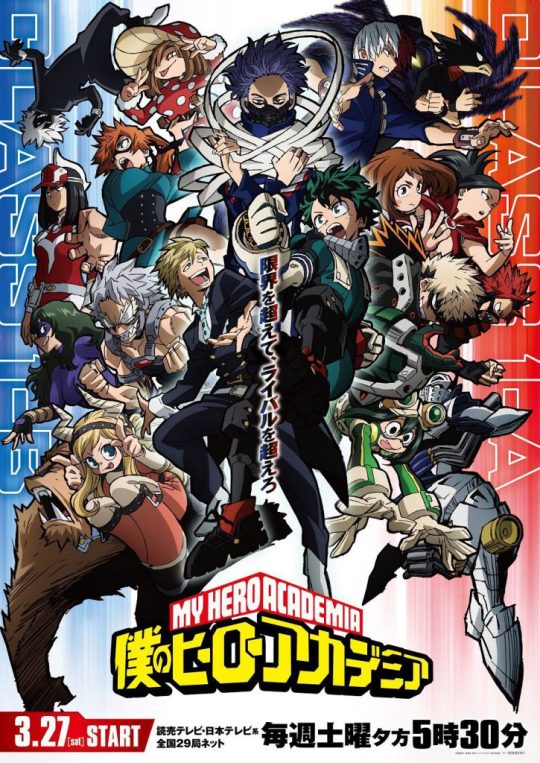
Boku no Hero Academia has a new season. To be honest I don’t remember what number we’re on. This season, so far, focuses on a tournament-style competition between the two main hero classes. I would much prefer the plot to move on to something more exciting involving the villains, but I suppose they have to throw arcs like this in every so often just to remind everyone of which characters have which quirks. The plus point is that instead of being an individual competition, it’s team-based. What this ultimately means is that characters that are viewed as weaker or having more obscure quirks actually get a chance to shine. These are characters who definitely aren’t going to win one-on-one battles. In an individual tournament, it’s pretty much a given that characters like Deku, Bakugou, and Todoroki are going to win most of the matches. But in a team, everyone has to work together. The end result is that the lady characters, all of whom have fairly weak or situational quirks, finally FINALLY get to actually do stuff! Even better, in several of the match-ups, the girls have taken the lead in planning and strategizing. It’s been pretty nice to watch. The girls from the other class have been very proactive as well. I really wish the girls could do more in “real” battles with villains, since it’s clear that they can step up when they need to. Who knows? Maybe this is a sign of good things to come.
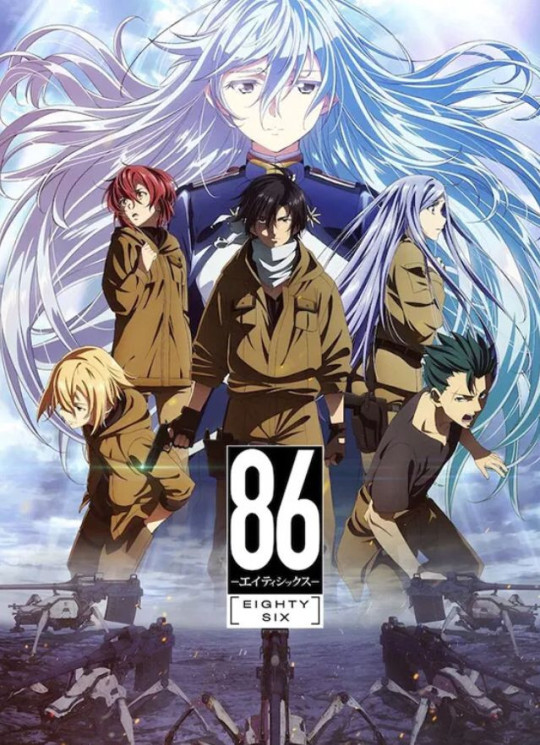
86 is a new mecha/sci-fi anime based on a series of light novels. The setup is fairly cool: In a country where everyone has silver hair and eyes, the people live in what looks like a utopia. There is a war going on outside their protected land but all combat is performed by automated robots, so there are no human casualties... or so the government would have the people believe. In reality, there is a district that exists on the outskirts of the country called 86, where people who don’t have silver hair and eyes are sent to pilot the robots and fight to protect the country that shunned them. Most of the pilots are children or teenagers. The mortality rate is high. Only a few people in the government know of their existence, mostly military types that include “handlers”. These handlers each take on an 86 unit and communicate with them through a system called “para-raid”. Using this, they monitor the battlefield from their safe positions and issue commands. Naturally, most handlers view their units as nothing more than tools in the war, and most 86-ers view their handlers as privileged snobs who know nothing of actual battle. The real plot kicks in when Lena, a young Major, becomes the new handler for a particular 86 unit. Lena is sympathetic to the people of 86, but it’s going to be hard getting her notoriously rough unit to accept her. The plot is a bit complicated and the show deals with some weighty themes (racism, privilege, war, child soldiers, death). Lena is a likable enough heroine and the members of 86 are all interesting and fairly well written. The music is fine. The art... well, it’s pretty to look at, but it feels a bit generic to me. A bit too shiny. The mecha designs are great, but I’m not crazy about the character designs, which feel like they could be from any other modern anime. I also find it sad but hilarious at the same time that the women’s military uniforms are clearly designed for fanservice (they include mini skirts, thigh-highs with garters, and a short jacket that opens up just above the chest to show the tight shirt underneath) while the men’s uniforms are just totally normal military wear. To be honest it’s just too stupid to actually be offensive, so it comes across as comical. Thankfully, the interesting setup and plot carry the show, making it good enough to overlook the generic visuals.
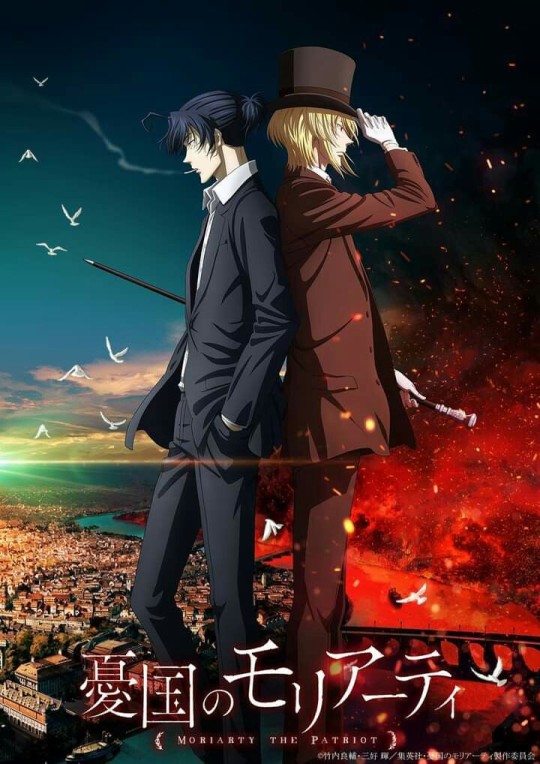
Moriarty the Patriot has a new season... maybe? I think it’s technically still season one, but with a split cour. Regardless, it feels like a new season so I’m treating it as such. The series focuses on famous Sherlock antagonist Moriarty, here represented as a trio of handsome brothers (though one of them is clearly the protagonist and the leader of the group) who work as “crime consultants” and basically help the lower classes wage class warfare against the nobility. This season shifts the focus away from the individual crimes Moriarty concocts and instead focuses on larger-scale conflicts that involve government conspiracies, corrupt cops, etc. We’re also treated to a lady James Bond (finally!), fixing one of the very few complaints I had about the first cour (that it lacked strong lady characters). The show remains very compelling, with beautiful art and excellent new opening and ending themes.
Best of Season:
Best New Show: Godzilla Singular Point
Best Opening Theme: Godzilla Singular Point
Best Ending Theme: Mars Red
Best New Male Character: Maeda (Mars Red)
Best New Female Character: Sawa (Joran)
#Anime Reviews#Spring 2021 Anime#Seasonal Anime Reviews#Seasonal Anime#Anime#Text#Godzilla Singular Point#Mars Red#moriarty the patriot#Fumetsu no anata e#Burning Kabaddi#86
39 notes
·
View notes
Note
I really want to read the post where you say "why Ravenclaw is the House that suits MC the most in the main story" but I dont find it
I haven’t ever made a full length post about it, come to think of it. I’ve talked about it in previous Ask responses but admittedly I have quite a few of those. So I suppose now is as good a time as any!
Ultimately, HPHM’s story is designed so that any House can work for Jacob’s Sibling. Obviously, no one House is “canon” over the others. But in my personal opinion, certain Houses do make more sense for different reasons. Everything can change based on how you characterize MC, but setting aside the dialogue choices, they tend to have a general personality that fills in for most of the scenes. It’s average, a kind of “everyman” type. And certain choices can arguably be considered “canon” when they’re the ones that are free, placed next to choices that are locked behind attributes or friendship checks. That is the general vision of MC that I’ll be analyzing.
But first, the characters.
One of the primary reasons that MC fits Ravenclaw the best in the Main Story is because there are several characters who are aligned to MC in their Sorting. They always follow MC to whatever House they go to. Thus it becomes a question of which house suits them the most. Rowan Khanna, I think, speaks for them-self. I could see them in any House but they are a Ravenclaw through and through. I bet the only reason they ever get Sorted anywhere else is because they ask the Hat to let them follow MC. They are absolutely brilliant, with a love of reading and learning new things. They’re eccentric as well, deeply creative and good at coming up with plans. They dream of being a Professor, and they turn to books above all else. Next we have Jacob. Another character who could go anywhere based on interpretation, but he strikes me as a Ravenclaw too. Several of the options you can give when expressing speculation about him suggest that the reason he probably investigated the Vaults in the first place was his thirst for knowledge, his desire to know their secrets. To be specific, his stubborn and obsessive need to know. I feel like Jacob couldn’t let this go until he had learned all of the hidden magic and secrets of the Vaults, until he realized far too late that he was in over his head, mixed up with R and everything.
Then there is Flitwick. A canon Ravenclaw of course, and one of the four Heads of House. It could be coincidental, but even if it is, Flitwick is easily the most developed of the Heads of House within this game. McGonagall is totally in character, but she’s part of the sideline outside of a small section of Year 2. Sprout contributes absolutely nothing, and Snape is likewise in character, but lacking anything to do until Rakepick shows up. Flitwick prepares MC for the first duel with Merula and gives them counsel. I suppose it’s not that much more than McGonagall teaching them the revealing spell in Year 2, but this felt so much more personal. You have the chance to make a promise to Flitwick, and either keep it or break it. In Year 4, he is I think the only teacher to speak up in Rakepick’s defense, and this leads into even further development of his character. By Year 5, he starts to warn MC not to investigate the Portrait Curse, but stops mid-sentence as he realizes that nothing he can say will stop them. I bring all of this up because Flitwick being such a fleshed out character in this game kind of goes hand in hand pretty well with the idea that he is MC’s Head of House. He is the only Head who shows the slightest bit of remorse when banning MC from Hogsmeade. With him, you really get the sense that he’s being overruled and doesn’t agree with it. That he’s in MC’s corner. And god I love him. I won’t stray too far into the Quidditch characters, but I will say that Murphy and Orion are two other characters that stick with MC, who I could very much see as Ravenclaws, both in different ways. But still, it’s Jacob and Rowan who are most important in affecting the story.
Which brings me to the story itself.
Hogwarts Mystery is different from the story of Harry Potter. This is the tale of Jacob and his Sibling. In HP, we know from the beginning who the villain is, that he’s an evil monster. We know what he wants, and that he failed. It gets fleshed out more later but everything you need to know is in that first book. We see him, he clashes with Harry, and loses. The books are a hero’s journey. A story of good versus evil. They do have mystery aspects, each of the books has a mystery told within it’s pages. But the overarching story is not about what’s hidden in the trapdoor, or who opened the chamber of secrets. It’s about Harry and Voldemort’s rivalry, their hero/villain dynamic. Everyone knew going into DH that Harry would defeat him in the end because that’s how these things go. OOTP basically confirmed it but most fans had known for years.
HPHM is different.
There are heroic moments, and Merula in particular compares MC to being a “hero.” But nothing they do is heroic in the same way as Harry. They both take active roles in the story but in different ways. Harry is still reactionary. He takes it upon himself to solve the problems, but he still waits until the problems show up. MC plans to open the Vaults even before the Curses show themselves. They arrive at Hogwarts with a goal in mind, finding Jacob. And with Hogwarts Mystery, the overarching story is not a hero’s journey. Because MC is so much more ambiguous than Harry. It might seem redundant to say that this story is a Mystery, but it is. An ongoing investigation, the unraveling of a conspiracy. Learning the truth about just what went down during Jacob’s years at Hogwarts. By HBP, Voldemort was such a familiar presence that we were learning the ins and outs of his childhood, right down to how his parents met. By Year 6, we still have no idea what R really is, or what they want. We don’t even know what it stands for. The black and white of the books, the heroes and the villains...that’s all replaced with shades of gray. Jacob is constantly in the gray. So is Rakepick, at least at first. Don’t get me started on Merula. Ben is another character who is definitely good, but has gone through such a roller coaster about who he is and whether he can be trusted.
Then there’s the ambiguity of MC them-self. The hints that they don’t share everything with people, are prone to tricking others, and for all we know, might wind up on the Dark Side someday. I’ll admit, this can also lend itself well to MC being a Slytherin, and indeed there are dialogue choices that are locked behind being one. But I still feel as though MC playing detective throughout this entire game, that whole premise lends itself pretty damn well toward a Ravenclaw MC. They’re trying to defeat the bad guys, but their main method of preparing for that fight is not train up an army of students, it is to investigate the Vaults, and investigate R. Even going as far as to work with Wizarding police. Granted, I know Harry poked around a lot too. And MC does form the Circle of Khanna, just like how Harry formed Dumbledore’s Army. Both of them do exhibit both behaviors, but MC specializes in covert investigation more than preparation for combat. Again, at least they do so in the main story. The Circle of Khanna was not meant to be like Dumbledore’s Army, at least not in concept. MC first conceived it as the idea of standing toe to toe with the Cabal by having a secret organization of their own. I know that didn’t really land perfectly in actual practice but that was the whole idea. And if there’s one thing MC has a constant stream of, it’s ideas. Not always the right ones, not always fast enough, but they do have them, and these ideas steer the plot. In the main story and otherwise.
It’s probably a bit cheap to get meta, but so be it.
I can’t help but notice how, if we take every other contribution to the Potterverse into account...well then, we’ve got a Gryffindor Protagonist in the form of Harry. We’ve got a Slytherin Protagonist in the form of Albus Severus. And a Hufflepuff over in Fantastic Beasts with Newt Scamander. If MC is a Ravenclaw, then that completes the quartet. But there’s another Quartet out there as well - that of the Original Four. Rowan, Ben, Penny, and Merula. The Year 1 characters and the OG leads of the Hogwarts Mystery story. Notice anything about them? We have a Hufflepuff, a Gryffindor, and a Slytherin...but no Ravenclaw. None that is, unless MC, and therefore Rowan by extension, is a Ravenclaw. MC being Sorted into the House of Eagles completes both of these groups. I dunno, I just find it curious that unless the Player goes to Ravenclaw, the first student character we meet in that House shows up in Year 3. Because Jam City wrote in some amazing characters for Ravenclaw. My love of Tulip Karasu is well documented, but I also think Talbott is pretty damn fascinating. Andre and Badeea rock too! Ravenclaw is also a relatively neutral House. I’ve said before that HPHM ignores the House rivalries, and that’s easiest to incorporate in the House of Eagles, which mostly keeps to itself. It would not be socially strange for a Ravenclaw to have so many friends from different Houses. I’m not saying a Slytherin MC couldn’t befriend Ben, for example, but he’s a Muggle-born Gryffindor and that would be a big deal to everyone else. Again, not saying it couldn’t happen, just that it would turn heads and people within Slytherin might go as far as to treat MC like a traitor. I like this premise, but...would Felix seriously help MC prepare to fight Merula, a fellow Slytherin, on behalf of someone like Ben? There are other trivial problems, like the question of two male Prefects if MC is Gryffindor, etc.
But that’s just a few thoughts. Again, there’s clearly no “canon” House, and neither of my MCs are even in Ravenclaw. But I think it’s fun to explore the idea as Ravenclaw is a House that, I think, is sorely needing development.
#Harry Potter#Harry Potter: Hogwarts Mystery#HPHM Analysis#HPHM Jacob's Sibling#HPHM Jacob#Rowan Khanna#Filius Flitwick#HPHM#Ramblings#Long Post#Patricia Rakepick#HPHM R#The Circle of Khanna
29 notes
·
View notes
Text
Featherine Augustus Aurora
What is this guide?
<< Previous (Lambdadelta)
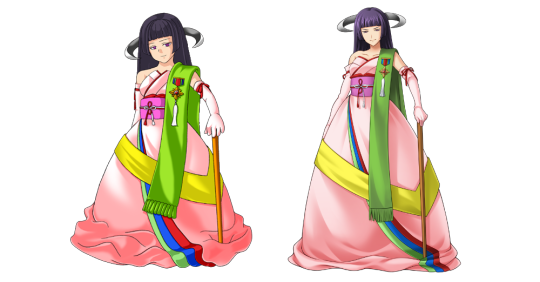
Reading List: Highlights
Umineko Episode 6/Dawn “??? Tea Party” [ Video / Text ]
Featherine requests her old miko return to her service once more. (Everything to know about Featherine’s personality in one scene)
Umineko Episode 6/Dawn “The Witch of Theatergoing” scene
Video [Scene starts roughly 6:20 and continues to the end of the video]
Text [Search on “Amakusa ran his finger down my cheek.” Scene continues to end of the page.]
[Spoilers - this references several major twists from the previous two Episodes, though not the truth of the mystery.] Featherine ropes another human into acting as her miko. (A demonstration of the way Featherine/Hachijou blends the mundane and the magical worlds.)
Umineko Episode 8/Twilight “Magical Battle” scene
Video [Scene starts roughly 38:40, stop before 53:35]
Text [Start at top of the page and stop at the screencap of the key.]
[Spoilers - this is one of the battles at the climax of Umineko! It doesn’t involve the core mystery, but it will spoil which characters ultimately side with the protagonists.] A scene for if you’re curious what happens when Featherine gets serious.
Reading List: I want it all
(These are all repeats from the list for Bernkastel.)
”Whose Tea Party?” [ Video / Text ]
Bern gets invited to a tea party. (A simple and silly scenario, but also a window into the differences in how Featherine and Lambda think of Bern.)
”Bernkastel’s Letter” [ Video / Text ]
Bernkastel writes a letter to (maybe) Featherine, explaining what she’s discovered about the rules to Beatrice’s game. (This is a bit of a strange one - to me it feels like some details of Bern’s relationships in this early work were retconned by the time of Umineko Episodes 6-8.)
Umineko Chiru (Episode 6/Dawn, Episode 7/Requiem, Episode 8/Twilight)
Umineko Saku’s Last Note of the Golden Witch involves Featherine somewhat. Blink and you’ll miss it, but she’s in 07th Theater too.
-...And that’s it! On the plus side, it’s easy to read all there is of Featherine, since there’s so little. Unfortunately, as you can see from the Highlights, what does exist is often neck deep in spoiler territory…
Wiki Links
https://07th-expansion.fandom.com/wiki/Featherine_Augustus_Aurora [Some spoilers, though only the same as in the Highlights links above.]
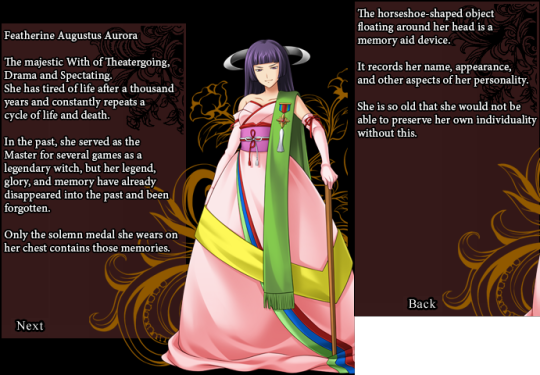
Quick Facts
-As Hanyuu is in Higurashi, Featherine is the closest being to a god in Umineko. However, while gods in Higurashi are related to Shinto concepts (plus parasites and viruses and aliens), Umineko’s godhood is based on the idea of an author being god of their story, summoning universes out of the nothingness of a blank page.
-Featherine’s unusual name is probably a reference to Hanyuu. The kanji for Hanyuu (羽入) are “羽=feather” and “入=in”. And Augustus Aurora = Hanyuu’s “Au au” catchphrase. Hachijou (八城) can also be read “yashiro,” as in Oyashiro-sama.
-Physically, Featherine appears as an elegant adult woman whose exact age is hard to place. She does not have horns, but she does have that suspiciously horn-like memory device floating around her head.
According to that Umineko Episode 8 battle scene linked above, Featherine’s memory device once was damaged, leading to Featherine having a different personality and appearance for a time.
(As it so happens, Hanyuu has a chipped horn and a very different personality from Featherine, what an intriguing coincidence...)
-Long before the events of Umineko, Featherine ascended to the realm of the gods and returned. She also goes through a cycle of sleep/death and rebirth which can last centuries. All aspects that call to mind that ascension Hanyuu mentions in Saikoroshi.
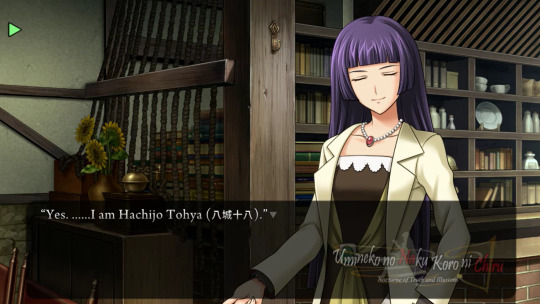
-Outside the Meta-World, Featherine’s double is a mysterious and reclusive author who goes by many names. (Hachijou Tohya is just one of them.)
-Remember how Ooishi and Akasaka write a book called “Higurashi no naku koro ni” in-universe? Umineko does something similar, but explores the idea even further. Hachijou is the supposed in-universe author of some of Umineko’s arcs, and as such, some fans consider Featherine/Hachijou as a stand-in for Ryukishi07 himself.

Personality
-Much as Bern’s personality is similar to “dark Rika” but kicked up to eleven, Featherine’s personality is similar to Hanyuu when Hanyuu acts as a god. She’s calm, serious, and refers to humans as “child of man.”
-Lacking Hanyuu’s shy and childish mannerisms, Featherine comes across as intimidating and rather condescending. Though she’s more polite and reasonable than the average witch. (Which honestly says more about other witches than her, really...)
-Bern and Lambda are very fey-like, tricking and tempting mortals into doing what they want. Featherine, in contrast, doesn’t use tricks or threaten violence because she doesn’t need to. Asking for consent from mortals is a gesture of respect from her - you don’t have the ability to refuse.
-In almost the inverse of Hanyuu, Featherine has no problems getting other characters to perceive her; indeed, she’s subtle but often quite forceful about dragging others into conversations inside her realm.
-Also unlike Hanyuu, Featherine has no particular love of sweets (that’s Lambda), and does seem to enjoy alcohol.
-Featherine, an ancient being, suffers from the “disease” of boredom. Entertaining herself with stories is the only medicine for this ailment, and the relief it provides is only temporary.
-As such, Featherine enjoys stories as deeply and thoroughly as possible. Meaning, she doesn’t just appreciate mysteries and characters as they’re first presented - she also likes to “tear out the guts” to see what makes them tick.
...Not with her own hands of course! That’s Bern’s job.
What, did you think you were done with the Watanagashi imagery when you finished Higurashi?
-At several points in Umineko, Featherine a gets called a monster. While this may be yet another callback to Higurashi, unlike Hanyuu who hates that label, Featherine takes it as a compliment.
-So… is Featherine evil? Many characters, and even Ryukishi07 himself in interviews, call her such. That being said, in Umineko, Featherine can be callous, but she doesn’t revel in sadism the way other witches do. Although, presumably she was much worse in the past...

Abilities
-Featherine is the “Witch of Theatergoing” - she is primarily a spectator to the events of Umineko, rather than a player on the stage. (Just like Hanyuu.)
-Bern’s “Theatergoing Authority” may derive from her. She also has the ability to instantly promote a character to the position of Game Master.
-Featherine is an author and therefore a “Creator,” surpassing the level of even powerful witches like Bern and Lambda. Her powers function as her breaking the fourth wall and literally writing the rest of the script on a page.
-Like Hanyuu, Featherine can stop time. Though unlike Hanyuu, Featherine can act in the frozen time, including that aforementioned reality writing.
-Featherine’s home is the *deep breath* “Great Witch of Theatergoing, Drama, and Spectating's Noble City of Carefully Selected Books” - an impossibly large magical library filled with countless stories, each a universe of their own like a Fragment. (Everyone just calls it the “City of Books.”)
-Featherine’s servants are the main characters of these stories, now in the form of black cats.
-Featherine’s relationships with her mikos are also through the lens of an author. Featherine’s mikos are also known as “Readers” - they narrate the events of a game board to Featherine. As an author is a god, a reader is also able to put their own interpretation on the story they tell.
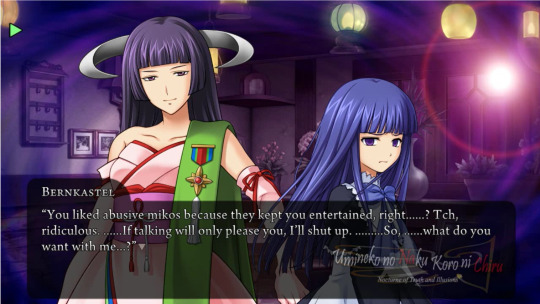
Featherine and Bernkastel
-As Hanyuu is to Rika, so Featherine is to Bern... more or less. They’re still a god and her miko.
-Unlike Rika and Hanyuu, Bern and Featherine do not share their senses.
-Rika and Bern have both lived beyond a normal human’s lifespan, but they both still consider themselves young in comparison to Hanyuu/Featherine’s ancient existence.
-When Rika would bully Hanyuu, Hanyuu did little but cry and complain. Bern still backtalks and is generally disrespectful of Featherine, but the result is different - Bern’s the one acting defensive and scared while Featherine is merely amused by it.
-Bern is also distrustful yet subservient toward Featherine in a way Rika never was to Hanyuu.
-However, when Bern is in danger, she will demand that Featherine help her, much as how Rika did the same to Hanyuu once in Matsuribayashi.
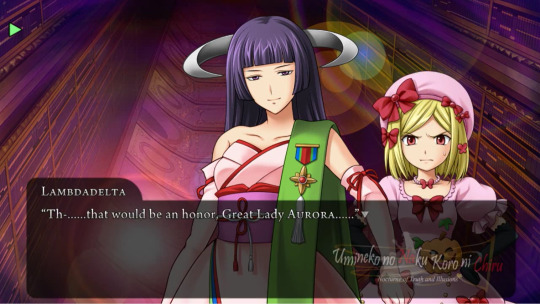
Featherine and Lambdadelta
-Featherine and Lambda appear to be on amicable, if not especially close terms.
-On Featherine’s side, she primarily seems to know Lambda as Bern’s friend and playmate.
-On Lambda’s side, she knows she’s completely outclassed by Featherine, and is very afraid of crossing her.
-Lambda does know quite a bit about Featherine - including that tidbit about Featherine’s personality change in the past.

Featherine in Higurashi Gou?
Is this Featherine? And what does that mean for the rest of Higurashi Gou?
Well, after reading this guide, what do you think?
Regardless, this is as far as I can guide you with my knowledge of Umineko. If you wish to go further, you’ll have to forge that path yourself, through the ravenous wilderness of unconfirmed theories and dangerous speculation.
Good luck!
PS: If you’d like a rough map of some popular destinations, I also have an old Bingo Card of Umineko-Gou connection theories.
PPS to folks from Reddit: If you liked this guide, I also do episode analysis/theory posts too.
#when they cry#higurashi#higurashi gou#umineko#featherine#furude hanyuu#my ramblings#higurashi guide to witches#I gotta say#even if gou ends up a disappointing mess#if nothing else#it gave me a reason to scream for weeks about these three assholes#something I thought I'd never have since I got into Umineko late#so thank you ryukishi07#sincerely
49 notes
·
View notes
Note
What’s a good comic that doesn’t involve superheroes?
oh buddy. pal. friendo. I’ll limit myself to books currently running to keep this only a single mile long. Note that depending on how loose your definition of “superhero” is will affect this. I’ve seen people call John McClane a superhero so yeah.
Something is Killing the Children
by James Tynion IV and Werther Dell'Edera (Boom! Studios)

Kids have been going missing in a sleepy woodland town. A strange woman named Erica arrives, determined to do something about it. She partners with a young boy who claims to have seen the thing stalking the town, and things quickly spiral further out of control. Well-written characters and fantastic art. Easily my favorite book running right now.
The Department of Truth
by James Tynion IV and Martin Simmonds (Image)

Cole Turner is an FBI agent who specializes in conspiracy theories and the deleterious effect it has on the minds of people obsessed with them. Unfortunately for him, he is about to discover that there is more going on under the surface than he realized and belief is far more powerful than he could ever imagine. Tynion is quickly becoming one of my favorite writers, and Simmonds’s art is even better here than it was in Dying Is Easy (which I also recommend). This series has one of the best first issues I’ve ever read, and I was hooked instantly. A definite recommend if you are as interested in conspiracy theories as I am.
Fire Power
by Robert Kirkman and Chris Samnee (Image)
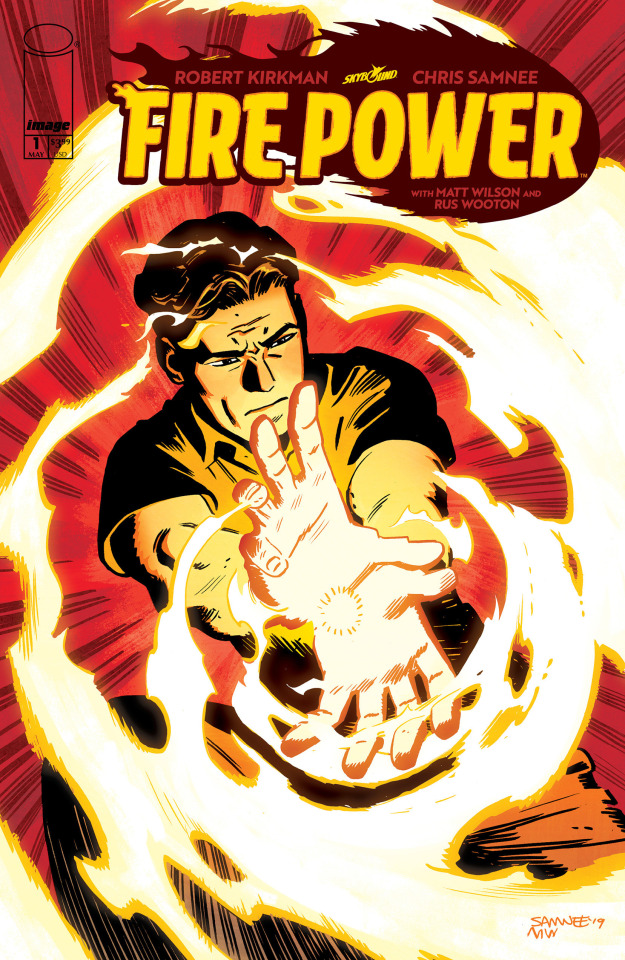
Owen Johnson is a regular dad in the suburbs. He has a great wife, two kids and a job working at his father-in-law’s antique shop. What sets him apart is that he had spent years of his early life in a Shaolin temple, mastering martial arts, including the legendary Fire Power, the ability to generate fire from his body. He has long since turned his back on his order and the responsibilities they demand, but his former life is not ready to let him go. Written by Robert Kirkman, creator of The Walking Dead and with art by the great Chris Samnee, Fire Power is a great martial arts comic, recommended for fans of Street Fighter or anyone who likes seeing monks and ninjas beat each other up. I definitely recommend starting from the “Volume 0″ prequel trade. It’s not ESSENTIAL but I believe the story flows much better with it that way.
Fear Case
by Matt Kindt and Tyler Jenkins (Dark Horse)

Two Secret Service agents are investigating the Fear Case, the Service’s oldest open case. All agents are put on the case, but are only given a single year to investigate, as the case has the tendency to ruin the lives of those who get too close. Winters and Mitchum are in the last three weeks before they have to turn the case over, but they are closer than anyone has gotten in the history of the Service to getting their hands on the legendary box. But the closer they get, the more bodies they seem to find, and the duo’s mental and emotional limits are stretched to their breaking point. Everything Matt Kindt writes is worth reading, and this series is no different. Recommended for fans of the X-Files and other supernatural mysteries.
I Breathed a Body
by Zac Thompson and Andy MacDonald (Aftershock)

Telling too much about this comic would honestly be spoiling it. In the not-too-distant future, the biggest social media influencer in the world posts something horrific and the macabre lengths his PR team go to to handle it. The art is extremely good at showing the body horror involved and while I do recommend the comic, be warned, it is *extremely* fucked up. Excellent horror comic.
Once and Future
by Kieron Gillen and Dan Mora (Boom! Studios)
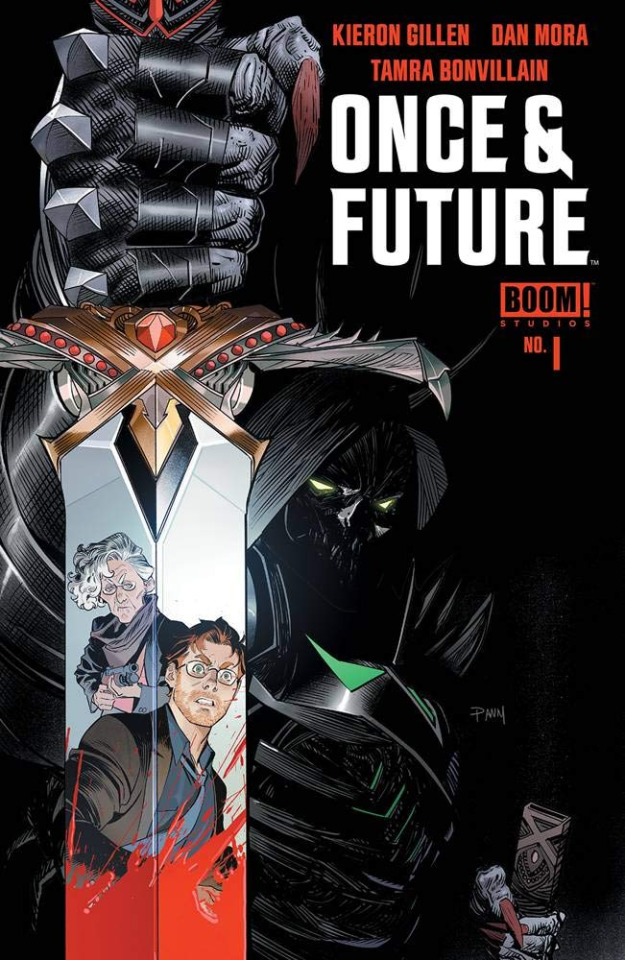
Terrorists resurrect King Arthur in a bid for power, but it turns out that the english legend is not what they thought or bargained for. Now, a retired monster hunter and her archeologist grandson must turn back the tide of returning myths before the world is irreversibly plunged into darkness. But their family history has plenty of shadows of their own. Really great book from two of my favorite creators, and really love the way they play with the metatextual nature of the myths and legends involved. Very fun.
Seven Secrets
by Tom Taylor and Daniele Di Nicuolo (Boom! Studios)
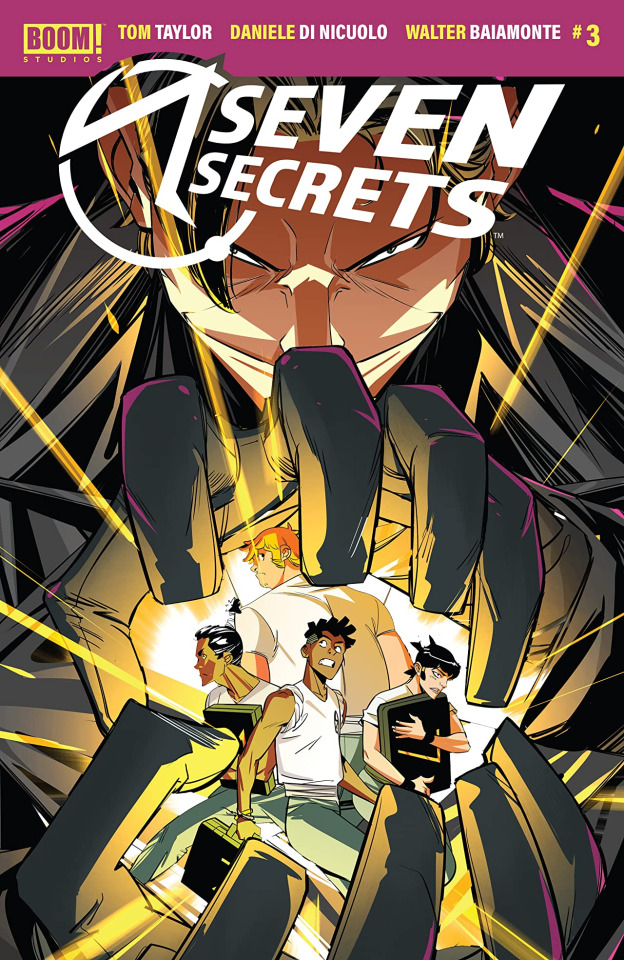
A clandestine order protects seven briefcases which hold seven secrets. However, a betrayal from within threatens to reveal those secrets, and Caspar, the son of two former protectors of the Seven Secrets, must discover the truth before all is lost. Tom Taylor is a fantastic writer that makes everything he writes infectiously fun, and with Di Nicuolo’s great eye for action scenes, this is an adventure book worth checking out.
Stillwater
by Chip Zdarsky and Ramón K. Pérez (Image)
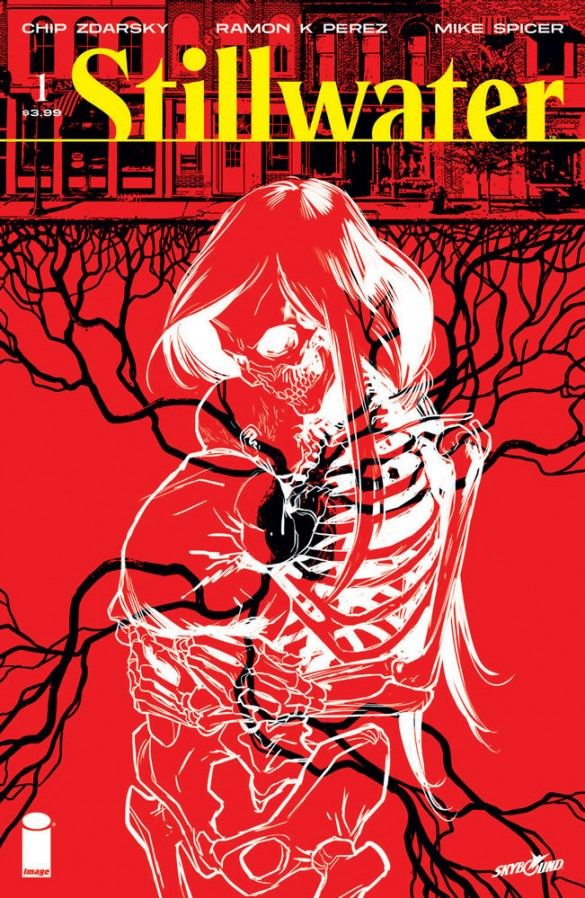
A promise of a substantial inheritance brings Daniel West and his friend to the quiet town of Stillwater. However, they quickly realize the town’s sinister secret: in Stillwater, nobody dies. And as the marketing for the book says, that’s not just a promise, it’s a threat. Good writing and an intriguing mystery. Highly recommended.
That Texas Blood
by Chris Condon and Jacob Phillips (Image)

The murder of his brother brings an aspiring writer back to the Texas town of his youth, and puts him on a violent road to his own undoing. Fantastic writing. If you’re like me and love dark neo-western and crime stories, then I honestly can’t recommend this book enough. Look elsewhere if you want happy endings.
We Only Find Them When They’re Dead
by Al Ewing and Simone Di Meo (Boom! Studios)
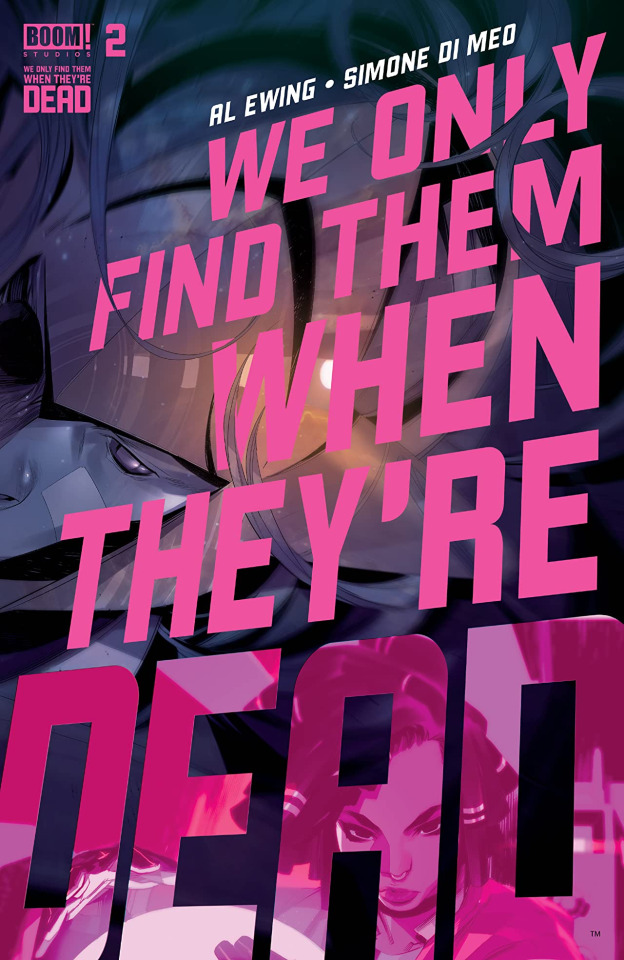
Captain Malik and his crew pilot an autopsy ship, so named because they harvest meat, metal and other materials from the fresh corpses of dead gods that appear on the edge of space. Malik wants to see a living god, and is willing to do whatever it takes to make that happen. But the ghosts of his past haunt him, and until he confronts them, making history won’t be easy. Fantastic cosmic sci-fi story with gorgeous art by Di Meo. Recommended for people who love stories set in space, and also for people who love long panels.
American Ronin
by Peter Milligan and ACO (AWA Upshot)
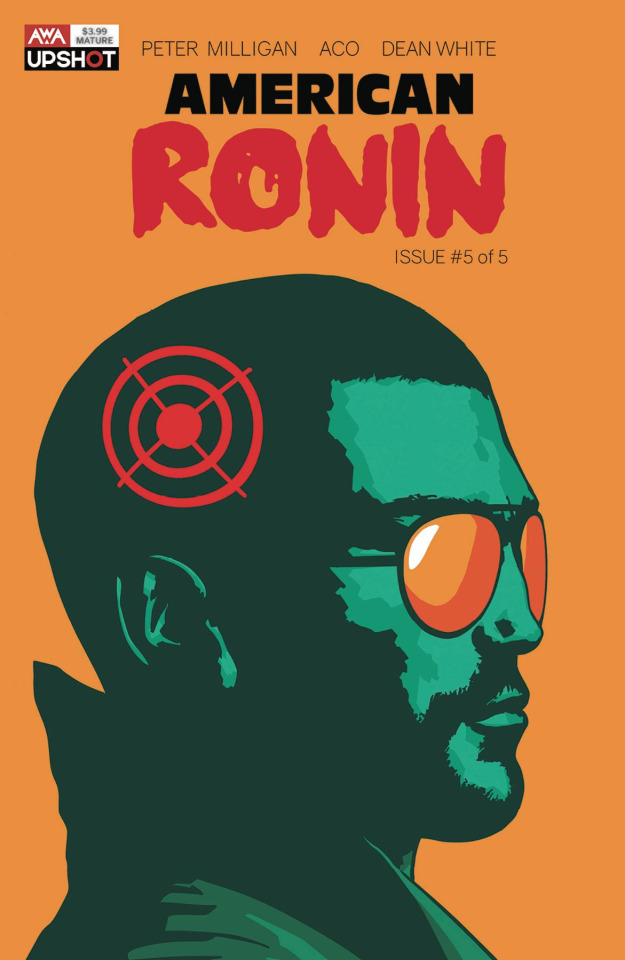
In a future where supercorporations rule everyone’s lives (I know that may be hard to visualize but try to imagine it), war is fought not by nations, but by enhanced operatives carrying out all manner of assassinations and espionage. But when one unnamed operative breaks his programming and goes on the hunt, the entire sick system is about to be violently brought down. Really interesting protagonist who has a great ability. Hunt down his targets by ingesting their DNA to learn how they think, and then using that empathic ability to get inside their heads. The cat and mouse games are really fun, and I highly recommend for anyone who likes superspy stories or seeing complex plans pay off.
Casual Fling
by Jason Starr and Dalibor Talajić (AWA Upshot)

Jennifer Ryan is a successful lawyer with a loving family and a great career, but a bad decision (that is, cheating on her stay-at-home husband) made on a whim has disastrous consequences. Saying much more would be spoiling, but there is definitely something sinister going on beneath the surface. Made in the style of erotic thrillers like Fatal Attraction and Eyes Wide Shut, this book features very well-written, realistic characters and importantly (to me anyway) refuses to condemn the protagonist while not shying away from the destructive results of her mistakes. I picked this book up because I liked Jason Starr’s previous book, Red Border, and enjoyed it a lot more than I thought I would. Recommended.
Bitter Root
by David F. Walker, Chuck Brown and Sanford Greene (Image)
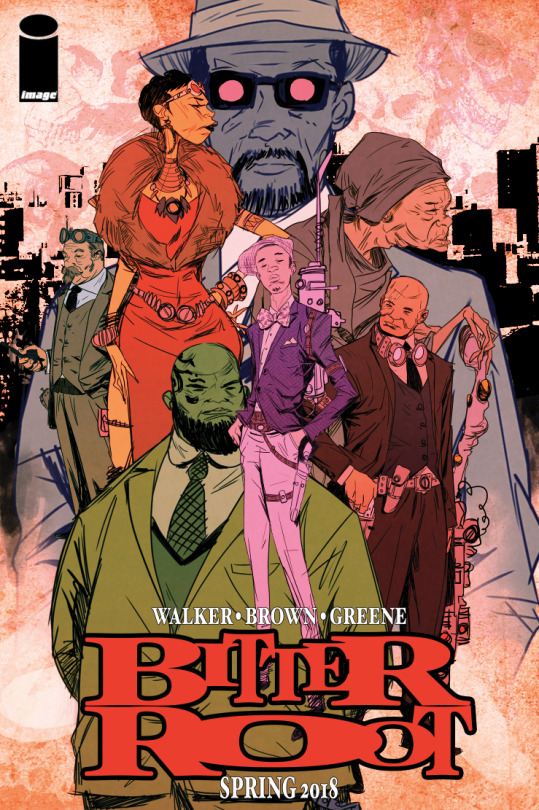
In 1920s Harlem, a long-standing family of monster hunters is splintering. Tragedy and conflicting worldviews are tearing them apart, and they’re going to need to stand together if they want to save New York City from the darkness that’s coming. Hate is a powerful thing, but also a cancer, and it’s about to metastasize. Really great worldbuilding and immediately likeable characters. Despite having a lot of themes about hate and prejudice (and utilizing them particularly well, in my opinion), the book is an exceptional action story. David F. Walker is a favorite writer of mine (See: Shaft, Nighthawk, Luke Cage) and Chuck Brown wrote the incredibly fun On the Stump (also highly recommended). The issues also feature essays from black scholars who expand on some of the historical events and themes that are present in the book, if you’re into that sort of thing (which I am). I’m not sure if those are in the trades, though.
Honorable Mentions/Books that I am too tired to give the full treatment to right now: Babyteeth (Aftershock) Chained to the Grave (IDW) Dead Dog’s Bite (Dark Horse) Decorum (Image) Deep Beyond (Image) Dryad (Oni Press) Family Tree (Image) The Goon (Albatross Funnybooks) Killadelphia (Image) Nocterra (Image) Neil Gaiman’s Norse Mythology (Dark Horse) Orcs (Boom! Studios) Orphan and the Five Beasts (Dark Horse) Outcast (Image) Proctor Valley Road (Boom! Studios) Redneck (Image) Sea of Sorrows (IDW) Second Coming (AHOY Comics) Silver Coin (Image) Tartarus (Image) Two Moons (Image) Undiscovered Country (Image) Undone by Blood (Aftershock) Vampire: The Masquerade (Vault Comics) Wynd (Boom! Studios) Year Zero (AWA Upshot) Honorable Mentions/Books that have ended but you should check out: A Walk Through Hell (Aftershock) American Born Chinese (First Second) American Vampire (DC Comics) Animosity (Aftershock) Archangel 8 (AWA Upshot) Bad Reception (Aftershock) Basketful of Heads (DC Comics) Black Science (Image) Blacksad (Dark Horse) Chew (Image) Dark Ark (Aftershock) Dark Red (Aftershock) Daytripper (DC Comics) Dead Day (Aftershock) Devil’s Highway (AWA Upshot) The Dollhouse Family (DC Comics) East of West (Image) Folklords (Boom! Studios) Gideon Falls (Image) God Country (Image) Grendel, KY (AWA Upshot) Hotell (AWA Upshot) Infidel (Image) Knights Temporal (Aftershock) Locke and Key (IDW) The Low, Low Woods (DC Comics) The Man Who Fucked Up Time (Aftershock) Midnight Nation (Image) Nailbiter (Image) Orc Stain (Image) Pestilence (Aftershock) Plunge (DC Comics) Preacher (DC Comics) Pride of Baghdad (DC Comics) Red Border (AWA Upshot) The Red Mother (Boom! Studios) The Replacer (Aftershock) Scalped (DC Comics) Scott Pilgrim (Oni Press) Strange Skies Over East Berlin (Boom! Studios) Tokyo Ghost (Image) Transmetropolitan (DC Comics) Unholy Grail (Aftershock) The Wicked + The Divine (Image) Y: The Last Man (DC Comics)
21 notes
·
View notes
Link
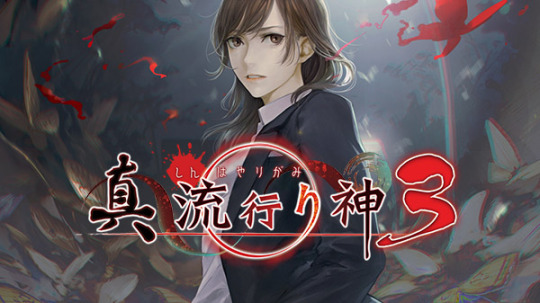
Nippon Ichi Software has released the first trailer, information, and screenshots for Shin Hayarigami 3, its newly announced horror visual novel sequel due out for PlayStation 4 and Switch on July 29 in Japan.
First, here is the trailer:
youtube
Get the details below.
■ Specifications
Title: Shin Hayarigami 3
Genre: Horror Adventure
Release Date: July 29, 2021 (Japan)
Platforms: PlayStation 4, Switch
Price: 7,678 yen
CERO Rating: Pending
Official Website: hayarigami.com

■ About
Nippon Ichi Software will release Shin Hayarigami 3 for PlayStation 4 and Switch on July 29, 2021 in Japan.
Shin Hayarigami 3 is the third entry in the “urban legends” horror adventure series Shin Hayarigami, which incorporates the gameplay systems of previous entries while further evolving the presentation of horror.
For the first information release, we will introduce the basic gameplay systems and characters.

■ The Latest Entry in the Shin Hayarigami Series
Shin Hayarigami is a horror adventure series that revolves around urban legends. While following the basic gameplay systems of previous entries, terrifying and mysterious incidents closely connected to urban legends await again players in Shin Hayarigami 3.
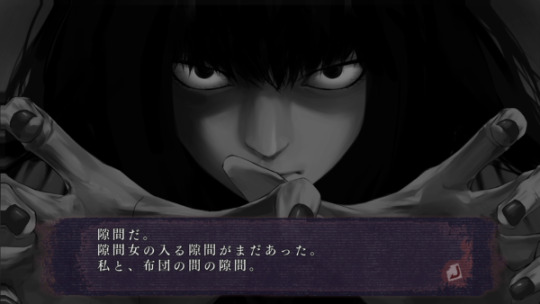

■ Further Evolved Presentation of Horror
In Shin Hayarigami 3, the presentation of horror is further evolved. In addition to the cut-ins and CG images from previous entries, CG images now move, allowing players to experience the vivid horror as if they were actually there.
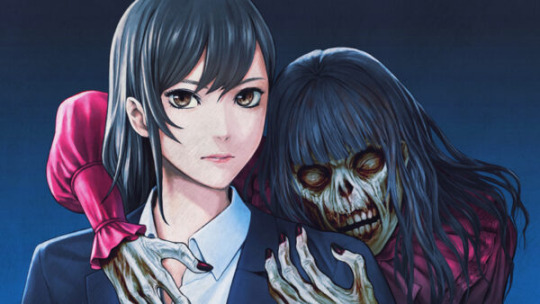

■ Mysterious Cases Where “Urban Legends” Become Reality
Urban legends… a never-ending game of telephone that involve several hundreds of thousands to several millions of people.
A friend of a friend. An acquaintance of an acquaintance. A creepy story told by someone suspicious.
In most cases, these stories are no more than fiction…
But in the Shin Hayarigami series, the story begins when a mysterious, “urban legend”-like incident actually occurs…
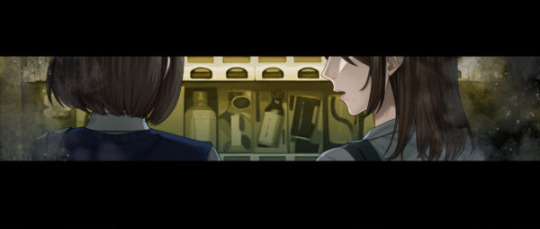
The Woman in the Crevices
An urban legend where a woman with a flimsy body enters the crevices in the walls and furniture, and motionlessly stares at you. It is a relatively major urban legend, and similar rumors are said to have existed since the Edo era.
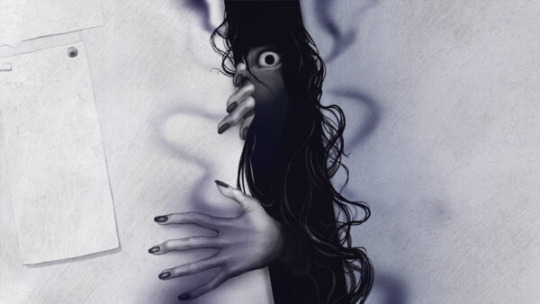
Human Stew
An old man living alone unfortunately died while bathing in reheated bath water. Days later, when a friend who discovered his corpse touched the old man’s remains, it crumbled and the bathtub became like stew…
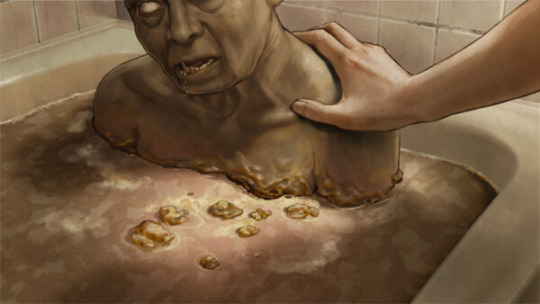
Demon Doll
Dolls ae common toys enjoyed by many. Therefore, there are many urban legends surrounding dolls, from puns to famous ghost stories such as “Mary-san.”
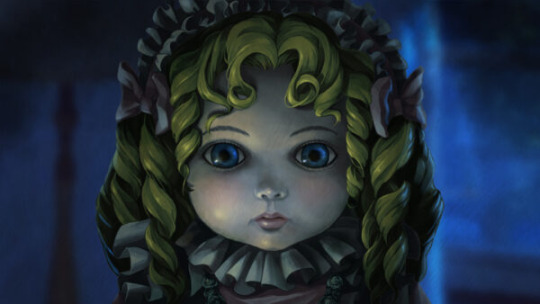
Ryoumen Sukuna
The story of Ryoumen Sukuna is both a folk tale and an urban legend. The urban legend Ryoumen Sukuna is a two-headed mummy with several limbs discovered when demolishing an old temple, where the people involved experienced mysterious illnesses or unforeseen incidents one after the other.
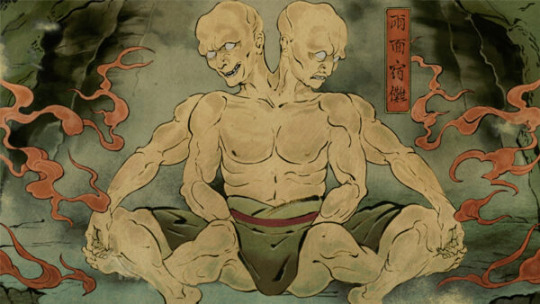
■ Science or Occult? Use Different Approaches to Determine the Truth
Like previous entries in the series, in Shin Hayarigami 3, the latter half of each case branches into either a scientific route or occult route depending on how you choose to investigate. Was it a human who caused the incident? Or was it a monster beyond human comprehension? Whichever stance you take, you will be able to approach a resolution to the case either way.
But if you want to determine the truth of a case, you must look at it from both a scientific and occult perspective.
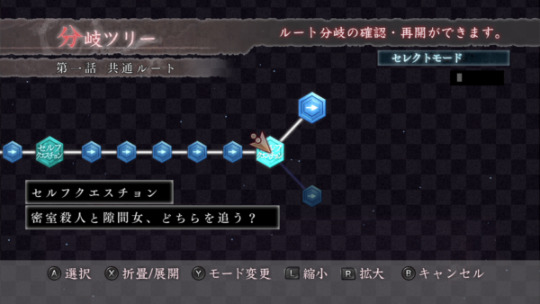
■ Become a Detective and Pursue Mysterious Cases
The protagonist is Saki Houjou, a detective who works in G Prefecture. In addition to fellow detective Sena Aizen, who became Saki’s partner in Shin Hayarigami 2, detectives Shinarou Niimi and Masaomi Kouketsu, formerly of the First Investigation Division, join the team to pursue mysterious, “urban legend”-like cases.


■ Characters
Saki Houjou
Age: 27
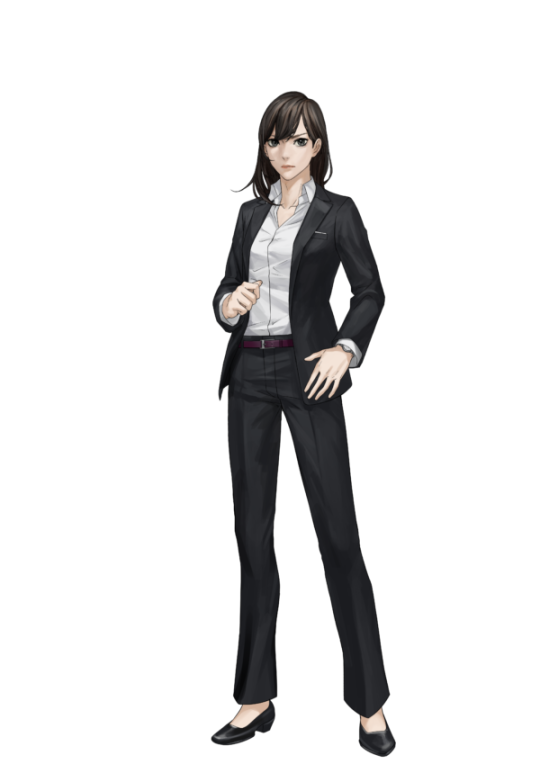
The protagonist. She was previously with the S Prefectural Police, but after her involvement in the “Blindman Case,” she was transferred to G Prefecture by transfer order and joined the newly established “Special Investigation Unit.” In the past, she was unable to stop a tragedy beyond her depth, so she stands against the mysterious cases that continue to occur as not to let that happen again.
Sena Aizen
Age: 25

Born and raised in G Prefecture, he is a hot-blooded young man who loves his hometown. His delinquent-like appearance and behavior have isolated him from others. While he is bad with women, he was assigned to the Special Investigation Unit with Saki Houjou, and has built up a strong level of trust through the numerous cases they resolved as her partner. As someone well-versed in urban legends, he is generally in affirmation of the occult.
Shintarou Niimi
Age: 32
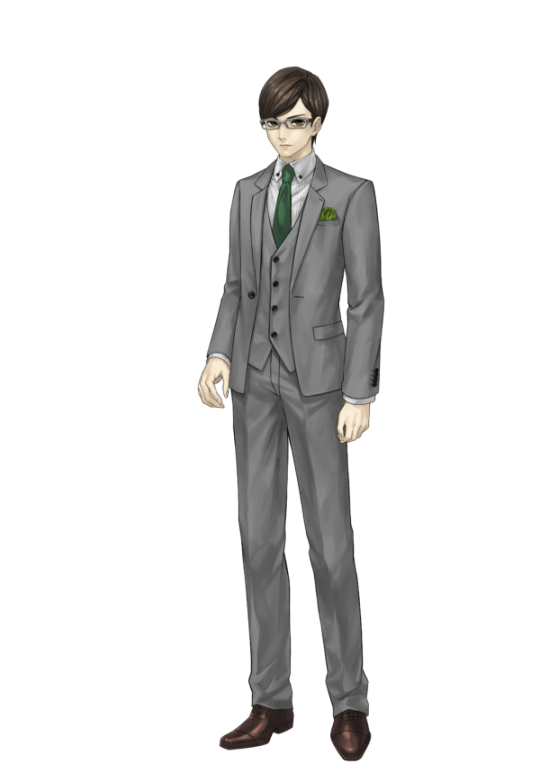
The most talented detective in the G Prefectural Police. An elite who graduated at the top of his class at The University of Tokyo Faculty of Law, he looks down on others, but has sincere respect for his partner and senior co-worker Masaomi Kouketsu. He is in direct denial of urban legends and the occult, and has a “water and oil”-like relationship with Sena Aizen. In Shin Hayarigami 3, he joins the Special Investigation Unit along with Masaomi Kouketsu, and gets stuck taking on mystery cases.
Masaomi Kouketsu
Age: 41
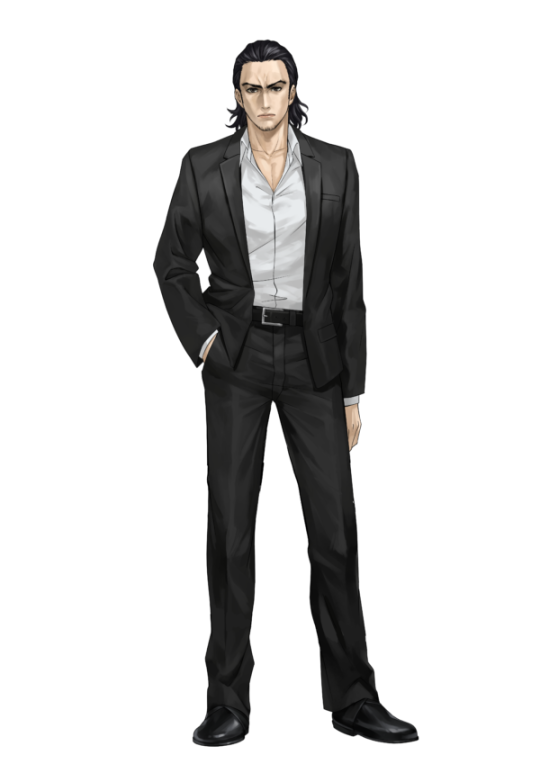
An untalkative veteran detective who boasts a high crime-arrest ratio with Shintarou Niimi. He places great emphasis on his old-school ways of investigating and obtaining information in the field. He has a strong obsession with tracking down the culprit of every difficult case. In Shin Hayarigami 3, he joins the Special Investigation Unit along with Shintarou Niimi and takes on mystery cases.
Mitsuko Kisaragi
Age: 37

A talented owman with a doctorate in a wide range of fields, not just forensic medicine. Although an expert in forensic investigation, she has deep knowledge of the occult, perhaps because she comes from a shrine family. She is a key player in the Special Investigation Unit, as she analyzes the information obtained by Saki Houjou and the others both scientifically and occultically, and advises them.
■ Fate Changes Based on Your Decisions
During investigation scenes, protagonist Saki Houjou and partner Sena Aizen will investigate and collect the information necessary to resolve the case.
Shin Hayarigami 3 also adds the duo Shinarou Niimi and Masaomi Kouketsu to your team, allowing you to obtain information about the choices you did not make.
—Saki and Sena investigate your choices.
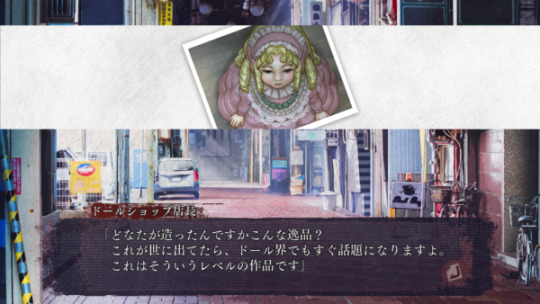
—The choices you do not make will be investigated by Shintarou and Masaomi.

■ Self Question
A “Self Question” occurs at key points in the story, in which you ask yourself questions and sort out the events and all the facts you have thus far. The results of a Self Question can change the development of the storyline that follows and become an important turning point in the story.
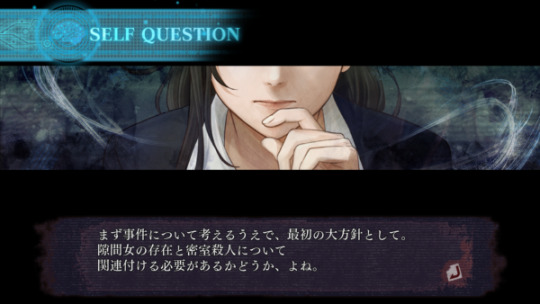
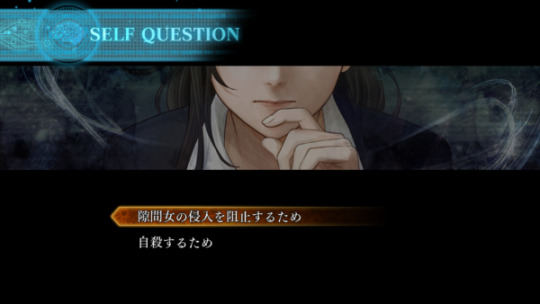
■ Courage Points
“Courage Points” are necessary in situations that demand courage or when making important decisions. If you run out of Courage Points, you will not be able to make decisions at important times, but if you just let them build up, you may be driven into a corner. Take action in a calculated manner.
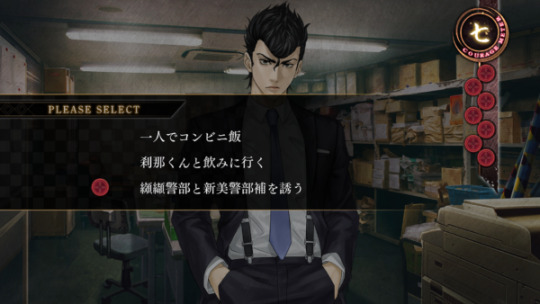

■ Liar’s Art
Not everyone involved in the mysterious incidents tell the truth as it happened. There may be situations where Saki must use her specialty psychology technique “Liar’s Art” to manipulate lies and throw them off balance in order to draw out the truth from those who conceal it or lie. By throwing out the right words within the time limit, you will shake up your opponent and reveal their true intentions.


The “Liar’s Meter” displays the opponent’s emotional changes. By making a choice that shakes the opponent, the meter will rise, and it will be easier to reveal their true intentions. If the Liar’s Art ends with the meter low, the situation worsens, but if it ends with the meter high, you can more easily reach the truth in the developments that follow.


■ Deduction Logic
“Deduction Logic” is a function that creates a correlation diagram of those involved in the case by applying keywords. Keywords can be acquired by proceeding with the investigation, and the more accurate the diagram, the closer you are to approaching the truth of the case.
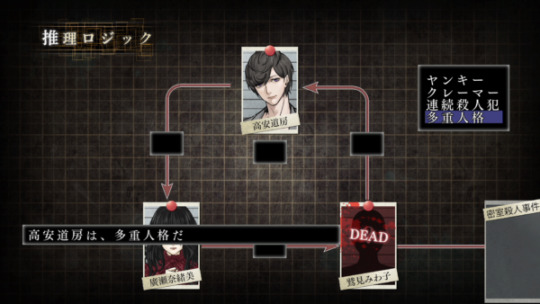

View the screenshots at the gallery.
#Shin Hayarigami 3#Shin Hayarigami#Hayarigami#visual novel#Nippon Ichi Software#Gematsu#long post#Hoping for a localization announcement.
20 notes
·
View notes